Organisational Change and Development
VerifiedAdded on 2020/10/05
|18
|6102
|302
AI Summary
This assignment provides a collection of research papers and studies on organisational change, development, and behaviour. It covers topics such as organisational culture, human resource practices, service innovation, leadership, employee attitudes, and energy usage habits. The documents are sourced from reputable journals and publications, offering insights into the complexities of organisational dynamics.
Contribute Materials
Your contribution can guide someone’s learning journey. Share your
documents today.
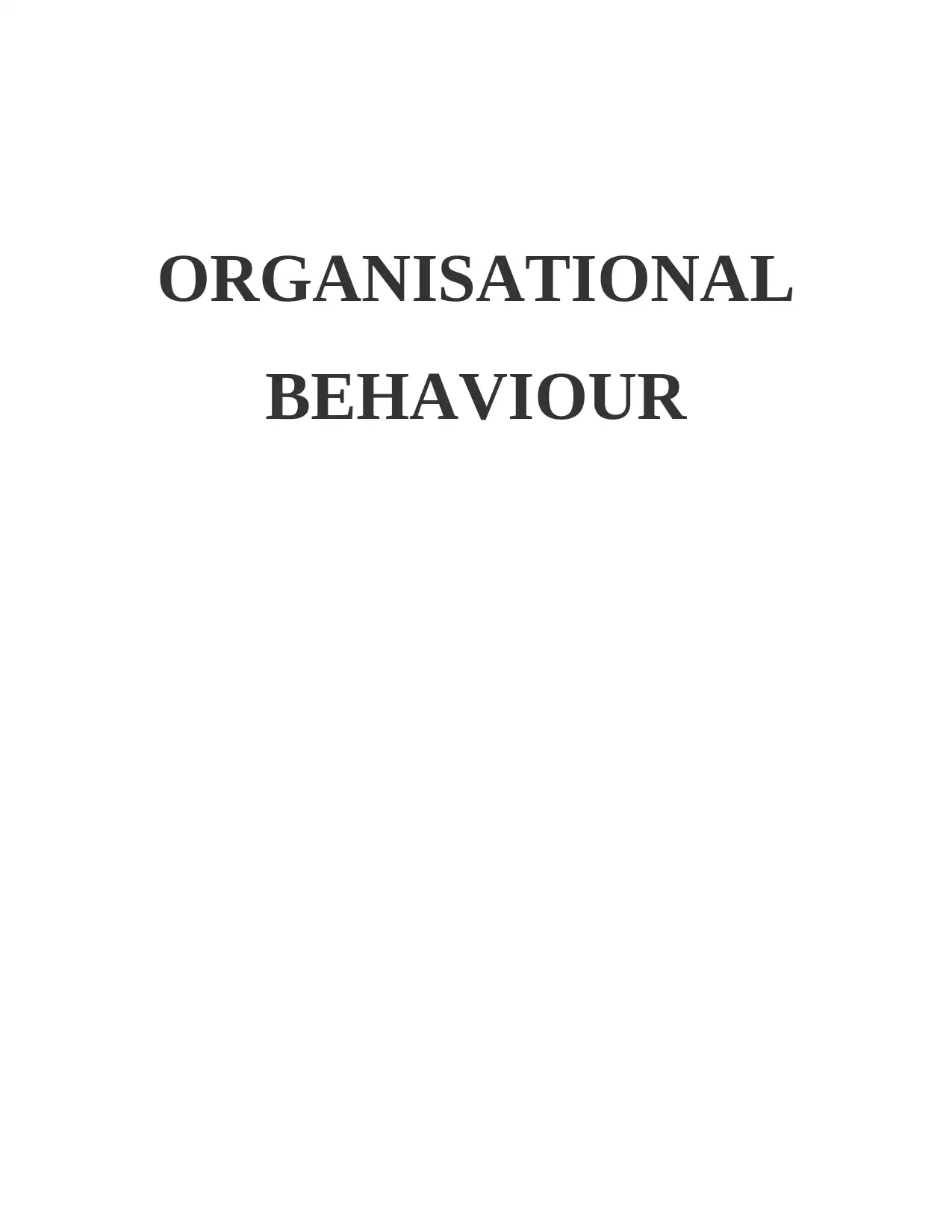
ORGANISATIONAL
BEHAVIOUR
BEHAVIOUR
Secure Best Marks with AI Grader
Need help grading? Try our AI Grader for instant feedback on your assignments.
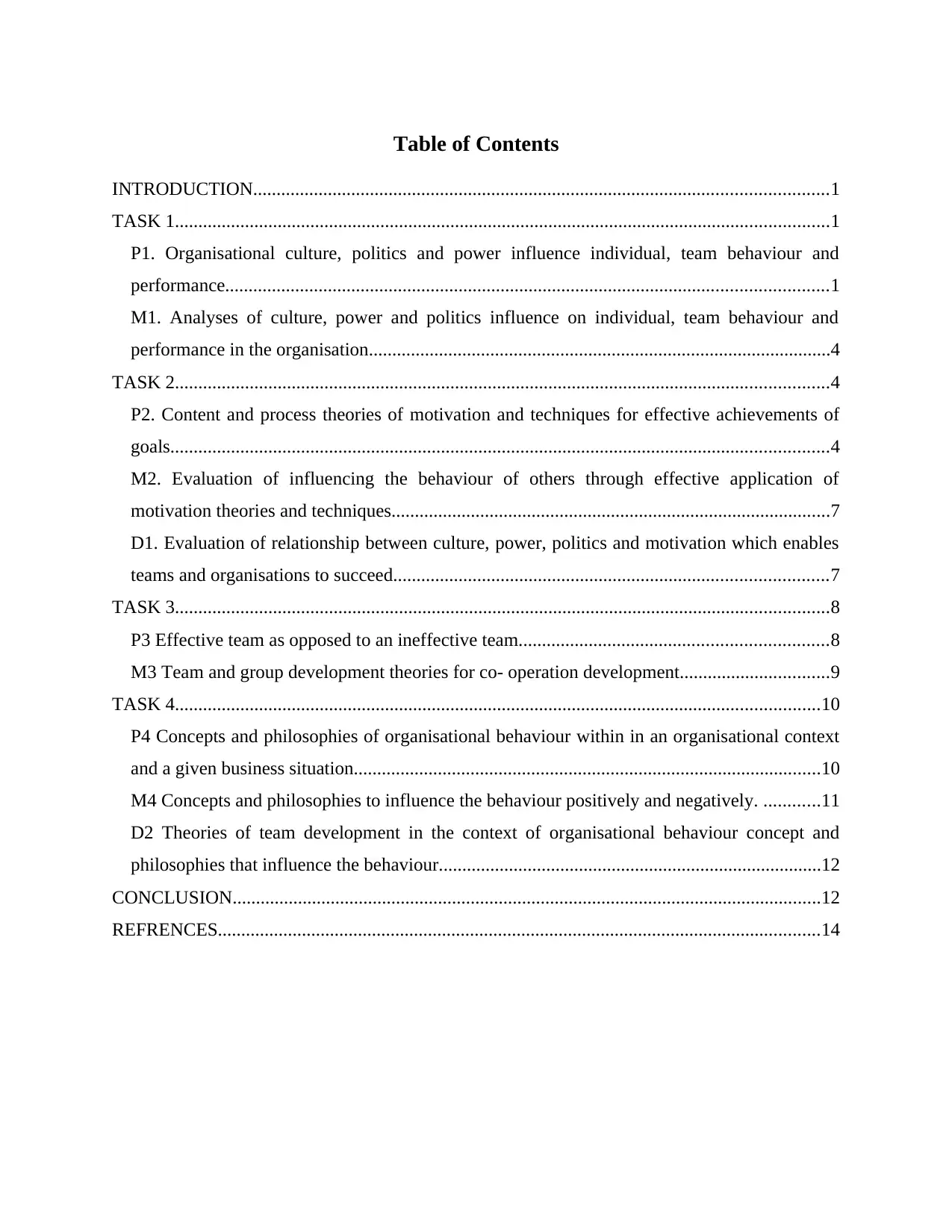
Table of Contents
INTRODUCTION...........................................................................................................................1
TASK 1............................................................................................................................................1
P1. Organisational culture, politics and power influence individual, team behaviour and
performance.................................................................................................................................1
M1. Analyses of culture, power and politics influence on individual, team behaviour and
performance in the organisation...................................................................................................4
TASK 2............................................................................................................................................4
P2. Content and process theories of motivation and techniques for effective achievements of
goals.............................................................................................................................................4
M2. Evaluation of influencing the behaviour of others through effective application of
motivation theories and techniques..............................................................................................7
D1. Evaluation of relationship between culture, power, politics and motivation which enables
teams and organisations to succeed.............................................................................................7
TASK 3............................................................................................................................................8
P3 Effective team as opposed to an ineffective team..................................................................8
M3 Team and group development theories for co- operation development................................9
TASK 4..........................................................................................................................................10
P4 Concepts and philosophies of organisational behaviour within in an organisational context
and a given business situation....................................................................................................10
M4 Concepts and philosophies to influence the behaviour positively and negatively. ............11
D2 Theories of team development in the context of organisational behaviour concept and
philosophies that influence the behaviour..................................................................................12
CONCLUSION..............................................................................................................................12
REFRENCES.................................................................................................................................14
INTRODUCTION...........................................................................................................................1
TASK 1............................................................................................................................................1
P1. Organisational culture, politics and power influence individual, team behaviour and
performance.................................................................................................................................1
M1. Analyses of culture, power and politics influence on individual, team behaviour and
performance in the organisation...................................................................................................4
TASK 2............................................................................................................................................4
P2. Content and process theories of motivation and techniques for effective achievements of
goals.............................................................................................................................................4
M2. Evaluation of influencing the behaviour of others through effective application of
motivation theories and techniques..............................................................................................7
D1. Evaluation of relationship between culture, power, politics and motivation which enables
teams and organisations to succeed.............................................................................................7
TASK 3............................................................................................................................................8
P3 Effective team as opposed to an ineffective team..................................................................8
M3 Team and group development theories for co- operation development................................9
TASK 4..........................................................................................................................................10
P4 Concepts and philosophies of organisational behaviour within in an organisational context
and a given business situation....................................................................................................10
M4 Concepts and philosophies to influence the behaviour positively and negatively. ............11
D2 Theories of team development in the context of organisational behaviour concept and
philosophies that influence the behaviour..................................................................................12
CONCLUSION..............................................................................................................................12
REFRENCES.................................................................................................................................14
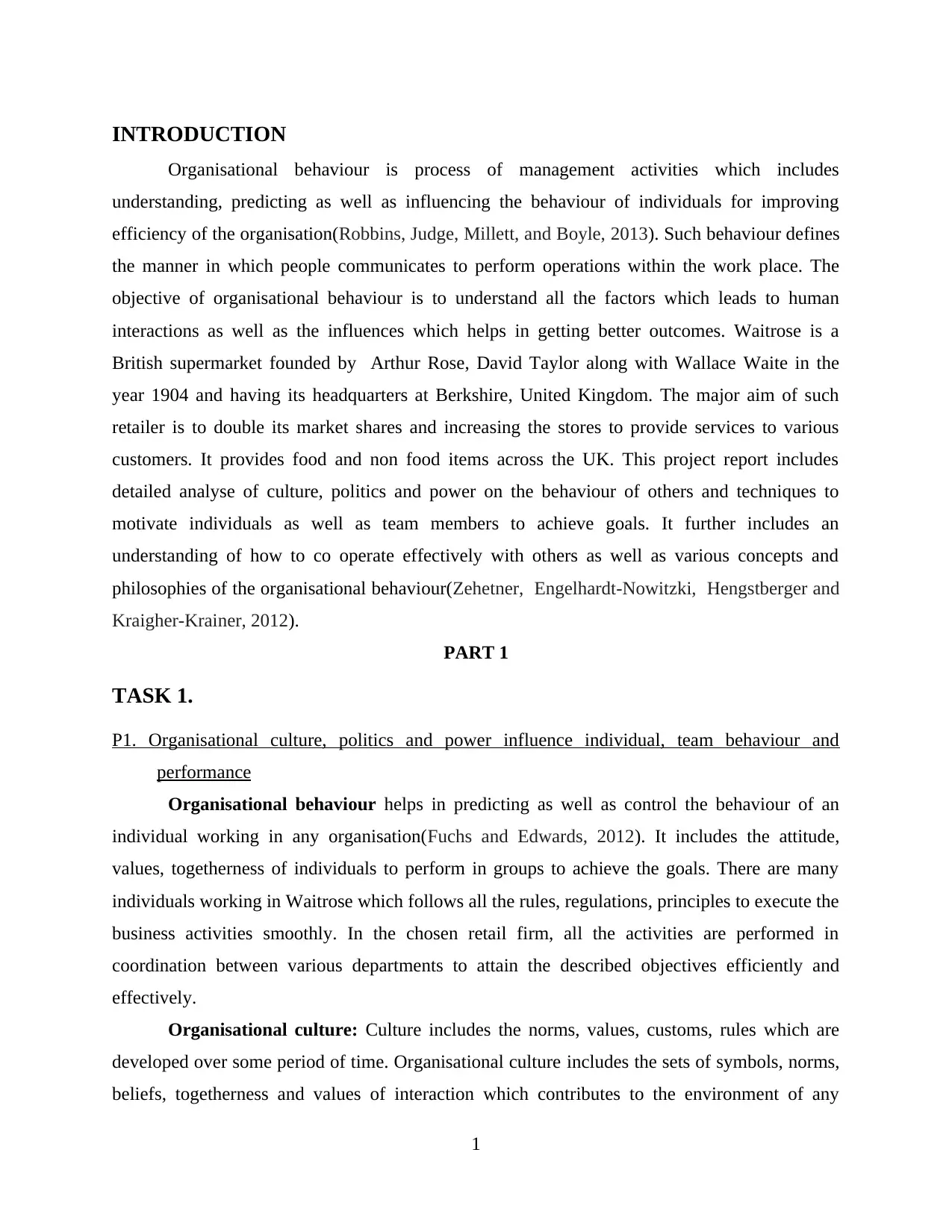
INTRODUCTION
Organisational behaviour is process of management activities which includes
understanding, predicting as well as influencing the behaviour of individuals for improving
efficiency of the organisation(Robbins, Judge, Millett, and Boyle, 2013). Such behaviour defines
the manner in which people communicates to perform operations within the work place. The
objective of organisational behaviour is to understand all the factors which leads to human
interactions as well as the influences which helps in getting better outcomes. Waitrose is a
British supermarket founded by Arthur Rose, David Taylor along with Wallace Waite in the
year 1904 and having its headquarters at Berkshire, United Kingdom. The major aim of such
retailer is to double its market shares and increasing the stores to provide services to various
customers. It provides food and non food items across the UK. This project report includes
detailed analyse of culture, politics and power on the behaviour of others and techniques to
motivate individuals as well as team members to achieve goals. It further includes an
understanding of how to co operate effectively with others as well as various concepts and
philosophies of the organisational behaviour(Zehetner, Engelhardt-Nowitzki, Hengstberger and
Kraigher-Krainer, 2012).
PART 1
TASK 1.
P1. Organisational culture, politics and power influence individual, team behaviour and
performance
Organisational behaviour helps in predicting as well as control the behaviour of an
individual working in any organisation(Fuchs and Edwards, 2012). It includes the attitude,
values, togetherness of individuals to perform in groups to achieve the goals. There are many
individuals working in Waitrose which follows all the rules, regulations, principles to execute the
business activities smoothly. In the chosen retail firm, all the activities are performed in
coordination between various departments to attain the described objectives efficiently and
effectively.
Organisational culture: Culture includes the norms, values, customs, rules which are
developed over some period of time. Organisational culture includes the sets of symbols, norms,
beliefs, togetherness and values of interaction which contributes to the environment of any
1
Organisational behaviour is process of management activities which includes
understanding, predicting as well as influencing the behaviour of individuals for improving
efficiency of the organisation(Robbins, Judge, Millett, and Boyle, 2013). Such behaviour defines
the manner in which people communicates to perform operations within the work place. The
objective of organisational behaviour is to understand all the factors which leads to human
interactions as well as the influences which helps in getting better outcomes. Waitrose is a
British supermarket founded by Arthur Rose, David Taylor along with Wallace Waite in the
year 1904 and having its headquarters at Berkshire, United Kingdom. The major aim of such
retailer is to double its market shares and increasing the stores to provide services to various
customers. It provides food and non food items across the UK. This project report includes
detailed analyse of culture, politics and power on the behaviour of others and techniques to
motivate individuals as well as team members to achieve goals. It further includes an
understanding of how to co operate effectively with others as well as various concepts and
philosophies of the organisational behaviour(Zehetner, Engelhardt-Nowitzki, Hengstberger and
Kraigher-Krainer, 2012).
PART 1
TASK 1.
P1. Organisational culture, politics and power influence individual, team behaviour and
performance
Organisational behaviour helps in predicting as well as control the behaviour of an
individual working in any organisation(Fuchs and Edwards, 2012). It includes the attitude,
values, togetherness of individuals to perform in groups to achieve the goals. There are many
individuals working in Waitrose which follows all the rules, regulations, principles to execute the
business activities smoothly. In the chosen retail firm, all the activities are performed in
coordination between various departments to attain the described objectives efficiently and
effectively.
Organisational culture: Culture includes the norms, values, customs, rules which are
developed over some period of time. Organisational culture includes the sets of symbols, norms,
beliefs, togetherness and values of interaction which contributes to the environment of any
1
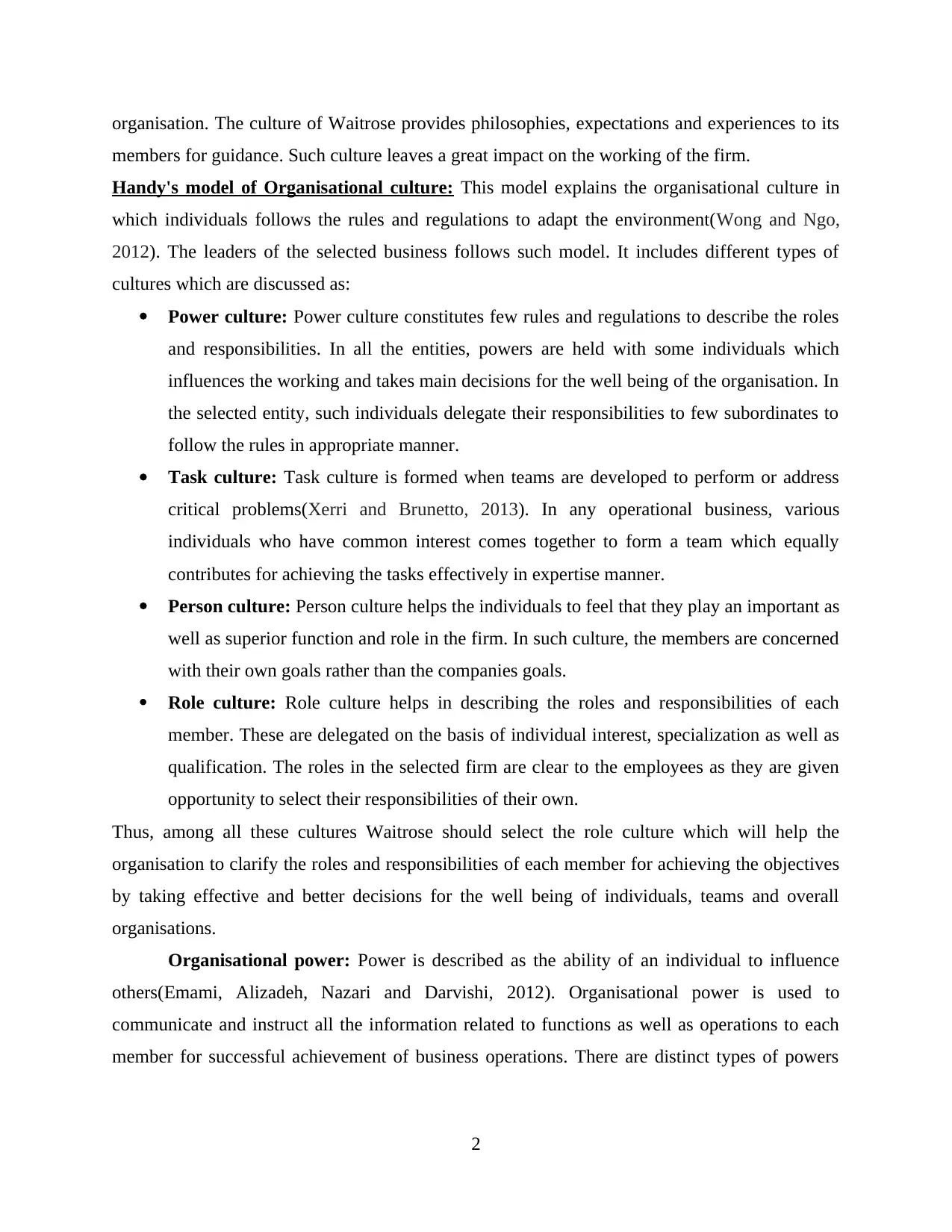
organisation. The culture of Waitrose provides philosophies, expectations and experiences to its
members for guidance. Such culture leaves a great impact on the working of the firm.
Handy's model of Organisational culture: This model explains the organisational culture in
which individuals follows the rules and regulations to adapt the environment(Wong and Ngo,
2012). The leaders of the selected business follows such model. It includes different types of
cultures which are discussed as:
Power culture: Power culture constitutes few rules and regulations to describe the roles
and responsibilities. In all the entities, powers are held with some individuals which
influences the working and takes main decisions for the well being of the organisation. In
the selected entity, such individuals delegate their responsibilities to few subordinates to
follow the rules in appropriate manner.
Task culture: Task culture is formed when teams are developed to perform or address
critical problems(Xerri and Brunetto, 2013). In any operational business, various
individuals who have common interest comes together to form a team which equally
contributes for achieving the tasks effectively in expertise manner.
Person culture: Person culture helps the individuals to feel that they play an important as
well as superior function and role in the firm. In such culture, the members are concerned
with their own goals rather than the companies goals.
Role culture: Role culture helps in describing the roles and responsibilities of each
member. These are delegated on the basis of individual interest, specialization as well as
qualification. The roles in the selected firm are clear to the employees as they are given
opportunity to select their responsibilities of their own.
Thus, among all these cultures Waitrose should select the role culture which will help the
organisation to clarify the roles and responsibilities of each member for achieving the objectives
by taking effective and better decisions for the well being of individuals, teams and overall
organisations.
Organisational power: Power is described as the ability of an individual to influence
others(Emami, Alizadeh, Nazari and Darvishi, 2012). Organisational power is used to
communicate and instruct all the information related to functions as well as operations to each
member for successful achievement of business operations. There are distinct types of powers
2
members for guidance. Such culture leaves a great impact on the working of the firm.
Handy's model of Organisational culture: This model explains the organisational culture in
which individuals follows the rules and regulations to adapt the environment(Wong and Ngo,
2012). The leaders of the selected business follows such model. It includes different types of
cultures which are discussed as:
Power culture: Power culture constitutes few rules and regulations to describe the roles
and responsibilities. In all the entities, powers are held with some individuals which
influences the working and takes main decisions for the well being of the organisation. In
the selected entity, such individuals delegate their responsibilities to few subordinates to
follow the rules in appropriate manner.
Task culture: Task culture is formed when teams are developed to perform or address
critical problems(Xerri and Brunetto, 2013). In any operational business, various
individuals who have common interest comes together to form a team which equally
contributes for achieving the tasks effectively in expertise manner.
Person culture: Person culture helps the individuals to feel that they play an important as
well as superior function and role in the firm. In such culture, the members are concerned
with their own goals rather than the companies goals.
Role culture: Role culture helps in describing the roles and responsibilities of each
member. These are delegated on the basis of individual interest, specialization as well as
qualification. The roles in the selected firm are clear to the employees as they are given
opportunity to select their responsibilities of their own.
Thus, among all these cultures Waitrose should select the role culture which will help the
organisation to clarify the roles and responsibilities of each member for achieving the objectives
by taking effective and better decisions for the well being of individuals, teams and overall
organisations.
Organisational power: Power is described as the ability of an individual to influence
others(Emami, Alizadeh, Nazari and Darvishi, 2012). Organisational power is used to
communicate and instruct all the information related to functions as well as operations to each
member for successful achievement of business operations. There are distinct types of powers
2
Secure Best Marks with AI Grader
Need help grading? Try our AI Grader for instant feedback on your assignments.
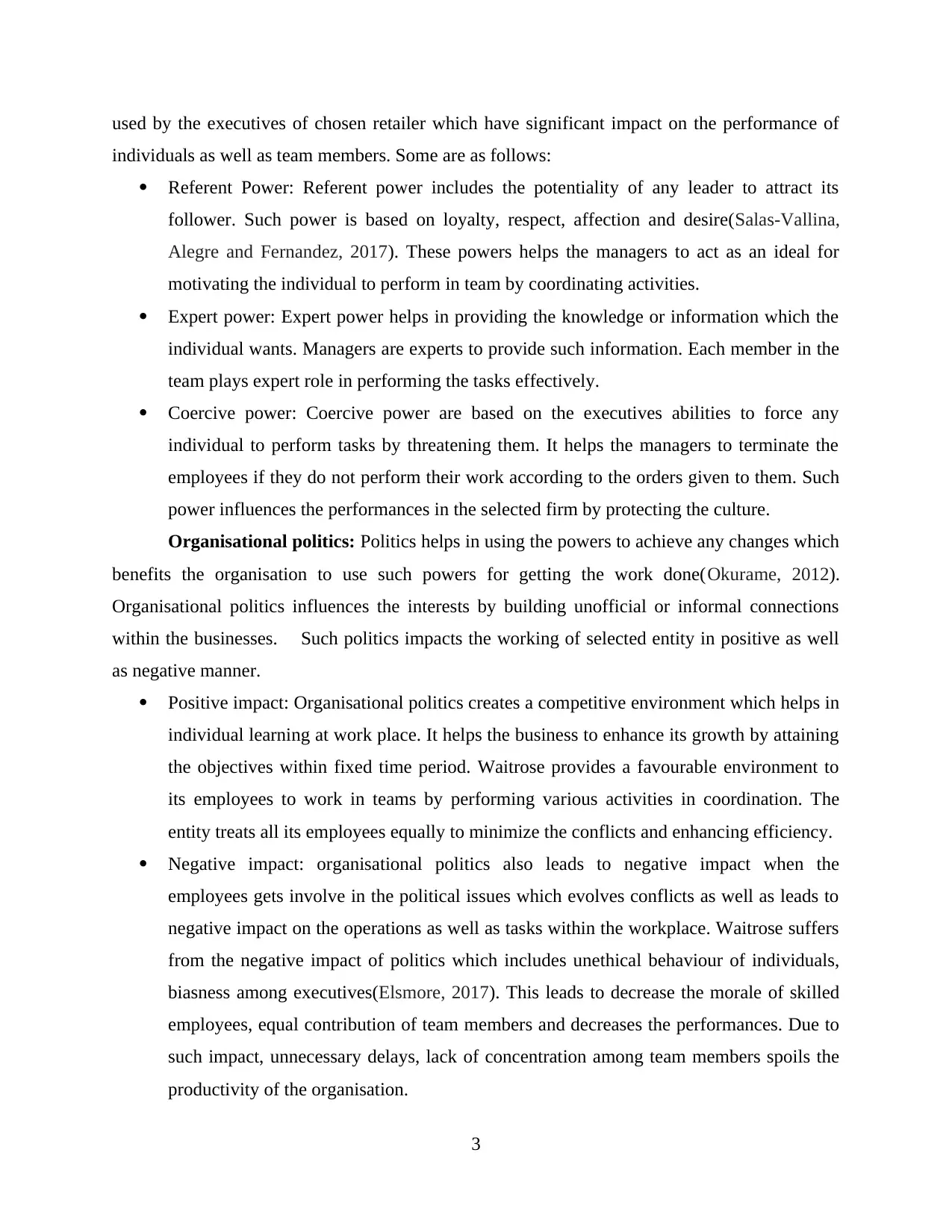
used by the executives of chosen retailer which have significant impact on the performance of
individuals as well as team members. Some are as follows:
Referent Power: Referent power includes the potentiality of any leader to attract its
follower. Such power is based on loyalty, respect, affection and desire(Salas-Vallina,
Alegre and Fernandez, 2017). These powers helps the managers to act as an ideal for
motivating the individual to perform in team by coordinating activities.
Expert power: Expert power helps in providing the knowledge or information which the
individual wants. Managers are experts to provide such information. Each member in the
team plays expert role in performing the tasks effectively.
Coercive power: Coercive power are based on the executives abilities to force any
individual to perform tasks by threatening them. It helps the managers to terminate the
employees if they do not perform their work according to the orders given to them. Such
power influences the performances in the selected firm by protecting the culture.
Organisational politics: Politics helps in using the powers to achieve any changes which
benefits the organisation to use such powers for getting the work done(Okurame, 2012).
Organisational politics influences the interests by building unofficial or informal connections
within the businesses. Such politics impacts the working of selected entity in positive as well
as negative manner.
Positive impact: Organisational politics creates a competitive environment which helps in
individual learning at work place. It helps the business to enhance its growth by attaining
the objectives within fixed time period. Waitrose provides a favourable environment to
its employees to work in teams by performing various activities in coordination. The
entity treats all its employees equally to minimize the conflicts and enhancing efficiency.
Negative impact: organisational politics also leads to negative impact when the
employees gets involve in the political issues which evolves conflicts as well as leads to
negative impact on the operations as well as tasks within the workplace. Waitrose suffers
from the negative impact of politics which includes unethical behaviour of individuals,
biasness among executives(Elsmore, 2017). This leads to decrease the morale of skilled
employees, equal contribution of team members and decreases the performances. Due to
such impact, unnecessary delays, lack of concentration among team members spoils the
productivity of the organisation.
3
individuals as well as team members. Some are as follows:
Referent Power: Referent power includes the potentiality of any leader to attract its
follower. Such power is based on loyalty, respect, affection and desire(Salas-Vallina,
Alegre and Fernandez, 2017). These powers helps the managers to act as an ideal for
motivating the individual to perform in team by coordinating activities.
Expert power: Expert power helps in providing the knowledge or information which the
individual wants. Managers are experts to provide such information. Each member in the
team plays expert role in performing the tasks effectively.
Coercive power: Coercive power are based on the executives abilities to force any
individual to perform tasks by threatening them. It helps the managers to terminate the
employees if they do not perform their work according to the orders given to them. Such
power influences the performances in the selected firm by protecting the culture.
Organisational politics: Politics helps in using the powers to achieve any changes which
benefits the organisation to use such powers for getting the work done(Okurame, 2012).
Organisational politics influences the interests by building unofficial or informal connections
within the businesses. Such politics impacts the working of selected entity in positive as well
as negative manner.
Positive impact: Organisational politics creates a competitive environment which helps in
individual learning at work place. It helps the business to enhance its growth by attaining
the objectives within fixed time period. Waitrose provides a favourable environment to
its employees to work in teams by performing various activities in coordination. The
entity treats all its employees equally to minimize the conflicts and enhancing efficiency.
Negative impact: organisational politics also leads to negative impact when the
employees gets involve in the political issues which evolves conflicts as well as leads to
negative impact on the operations as well as tasks within the workplace. Waitrose suffers
from the negative impact of politics which includes unethical behaviour of individuals,
biasness among executives(Elsmore, 2017). This leads to decrease the morale of skilled
employees, equal contribution of team members and decreases the performances. Due to
such impact, unnecessary delays, lack of concentration among team members spoils the
productivity of the organisation.
3
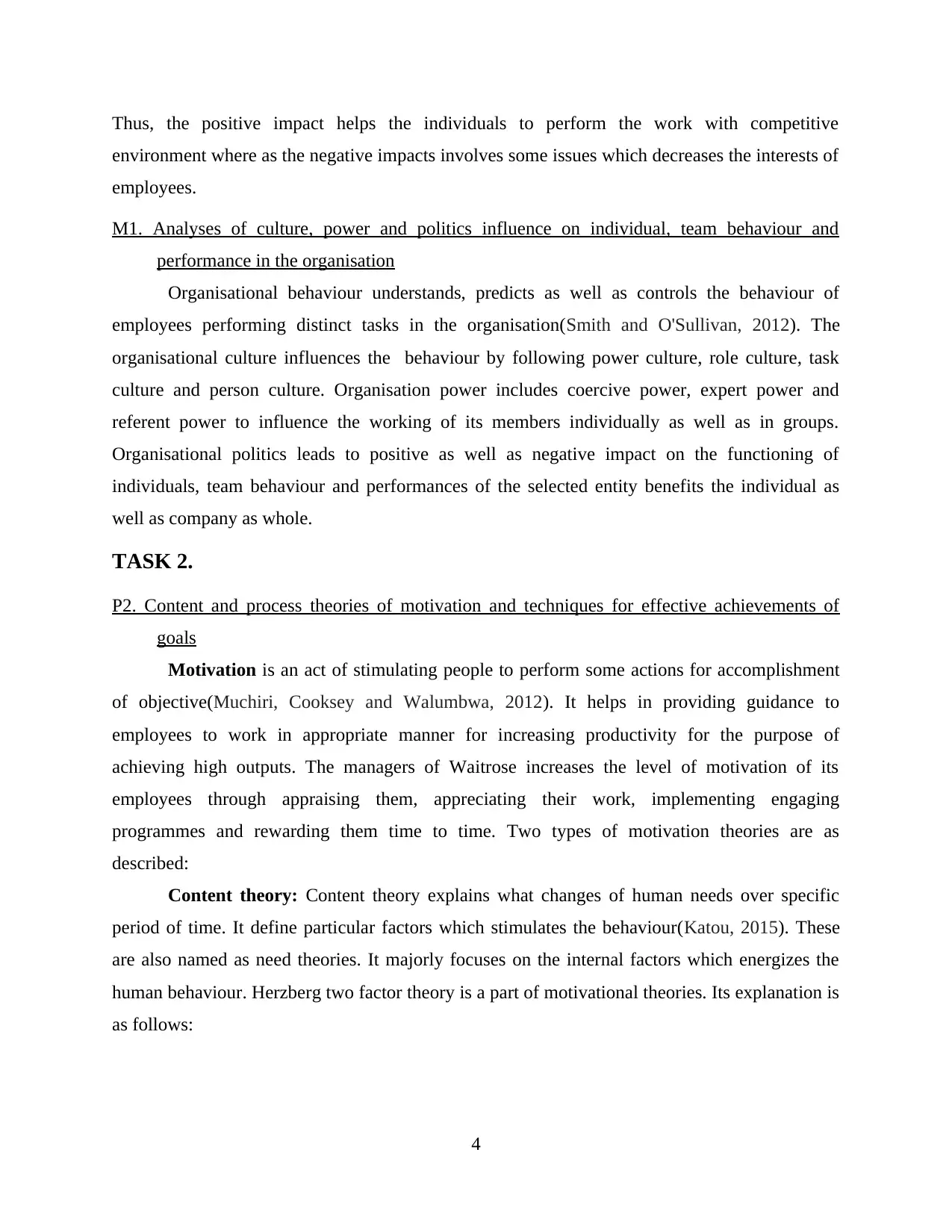
Thus, the positive impact helps the individuals to perform the work with competitive
environment where as the negative impacts involves some issues which decreases the interests of
employees.
M1. Analyses of culture, power and politics influence on individual, team behaviour and
performance in the organisation
Organisational behaviour understands, predicts as well as controls the behaviour of
employees performing distinct tasks in the organisation(Smith and O'Sullivan, 2012). The
organisational culture influences the behaviour by following power culture, role culture, task
culture and person culture. Organisation power includes coercive power, expert power and
referent power to influence the working of its members individually as well as in groups.
Organisational politics leads to positive as well as negative impact on the functioning of
individuals, team behaviour and performances of the selected entity benefits the individual as
well as company as whole.
TASK 2.
P2. Content and process theories of motivation and techniques for effective achievements of
goals
Motivation is an act of stimulating people to perform some actions for accomplishment
of objective(Muchiri, Cooksey and Walumbwa, 2012). It helps in providing guidance to
employees to work in appropriate manner for increasing productivity for the purpose of
achieving high outputs. The managers of Waitrose increases the level of motivation of its
employees through appraising them, appreciating their work, implementing engaging
programmes and rewarding them time to time. Two types of motivation theories are as
described:
Content theory: Content theory explains what changes of human needs over specific
period of time. It define particular factors which stimulates the behaviour(Katou, 2015). These
are also named as need theories. It majorly focuses on the internal factors which energizes the
human behaviour. Herzberg two factor theory is a part of motivational theories. Its explanation is
as follows:
4
environment where as the negative impacts involves some issues which decreases the interests of
employees.
M1. Analyses of culture, power and politics influence on individual, team behaviour and
performance in the organisation
Organisational behaviour understands, predicts as well as controls the behaviour of
employees performing distinct tasks in the organisation(Smith and O'Sullivan, 2012). The
organisational culture influences the behaviour by following power culture, role culture, task
culture and person culture. Organisation power includes coercive power, expert power and
referent power to influence the working of its members individually as well as in groups.
Organisational politics leads to positive as well as negative impact on the functioning of
individuals, team behaviour and performances of the selected entity benefits the individual as
well as company as whole.
TASK 2.
P2. Content and process theories of motivation and techniques for effective achievements of
goals
Motivation is an act of stimulating people to perform some actions for accomplishment
of objective(Muchiri, Cooksey and Walumbwa, 2012). It helps in providing guidance to
employees to work in appropriate manner for increasing productivity for the purpose of
achieving high outputs. The managers of Waitrose increases the level of motivation of its
employees through appraising them, appreciating their work, implementing engaging
programmes and rewarding them time to time. Two types of motivation theories are as
described:
Content theory: Content theory explains what changes of human needs over specific
period of time. It define particular factors which stimulates the behaviour(Katou, 2015). These
are also named as need theories. It majorly focuses on the internal factors which energizes the
human behaviour. Herzberg two factor theory is a part of motivational theories. Its explanation is
as follows:
4
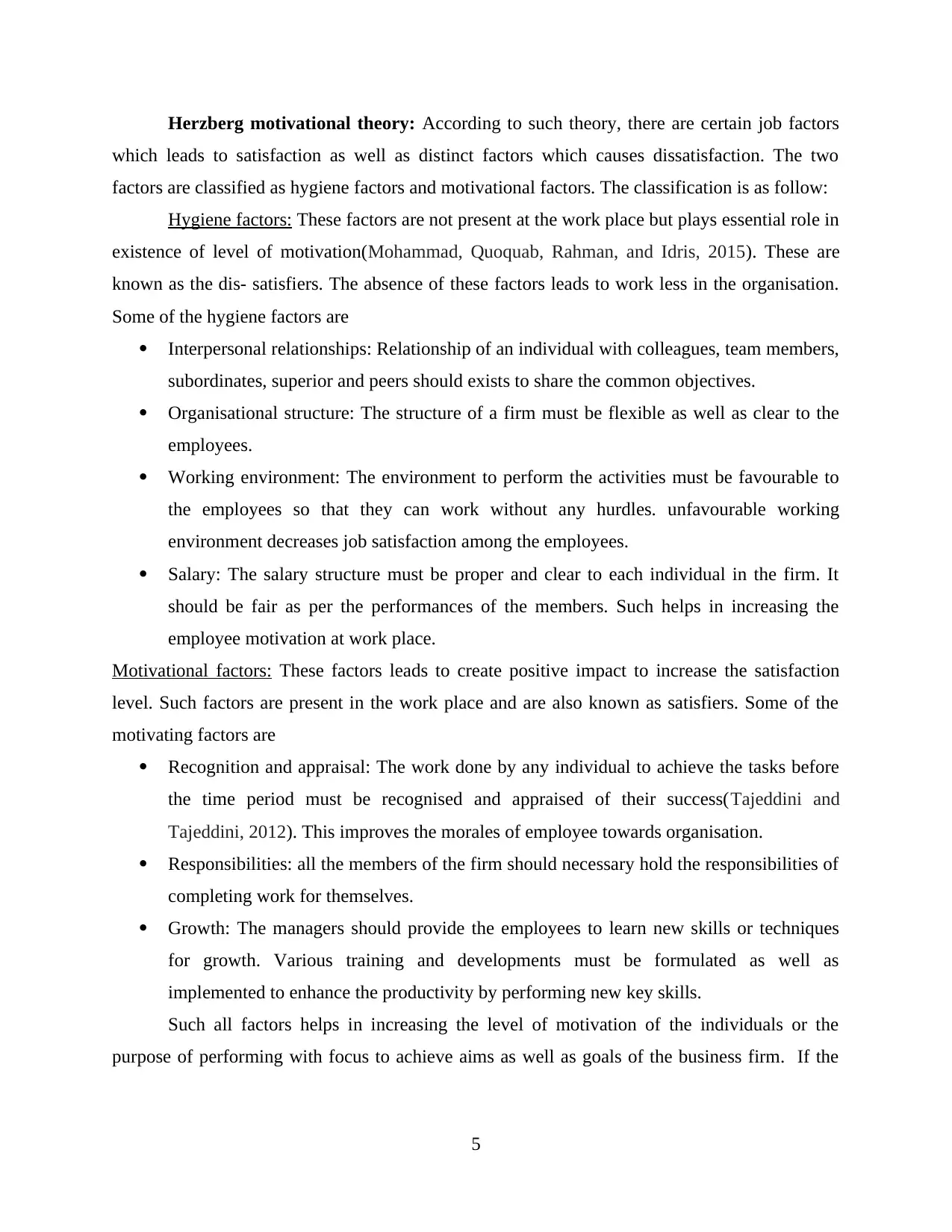
Herzberg motivational theory: According to such theory, there are certain job factors
which leads to satisfaction as well as distinct factors which causes dissatisfaction. The two
factors are classified as hygiene factors and motivational factors. The classification is as follow:
Hygiene factors: These factors are not present at the work place but plays essential role in
existence of level of motivation(Mohammad, Quoquab, Rahman, and Idris, 2015). These are
known as the dis- satisfiers. The absence of these factors leads to work less in the organisation.
Some of the hygiene factors are
Interpersonal relationships: Relationship of an individual with colleagues, team members,
subordinates, superior and peers should exists to share the common objectives.
Organisational structure: The structure of a firm must be flexible as well as clear to the
employees.
Working environment: The environment to perform the activities must be favourable to
the employees so that they can work without any hurdles. unfavourable working
environment decreases job satisfaction among the employees.
Salary: The salary structure must be proper and clear to each individual in the firm. It
should be fair as per the performances of the members. Such helps in increasing the
employee motivation at work place.
Motivational factors: These factors leads to create positive impact to increase the satisfaction
level. Such factors are present in the work place and are also known as satisfiers. Some of the
motivating factors are
Recognition and appraisal: The work done by any individual to achieve the tasks before
the time period must be recognised and appraised of their success(Tajeddini and
Tajeddini, 2012). This improves the morales of employee towards organisation.
Responsibilities: all the members of the firm should necessary hold the responsibilities of
completing work for themselves.
Growth: The managers should provide the employees to learn new skills or techniques
for growth. Various training and developments must be formulated as well as
implemented to enhance the productivity by performing new key skills.
Such all factors helps in increasing the level of motivation of the individuals or the
purpose of performing with focus to achieve aims as well as goals of the business firm. If the
5
which leads to satisfaction as well as distinct factors which causes dissatisfaction. The two
factors are classified as hygiene factors and motivational factors. The classification is as follow:
Hygiene factors: These factors are not present at the work place but plays essential role in
existence of level of motivation(Mohammad, Quoquab, Rahman, and Idris, 2015). These are
known as the dis- satisfiers. The absence of these factors leads to work less in the organisation.
Some of the hygiene factors are
Interpersonal relationships: Relationship of an individual with colleagues, team members,
subordinates, superior and peers should exists to share the common objectives.
Organisational structure: The structure of a firm must be flexible as well as clear to the
employees.
Working environment: The environment to perform the activities must be favourable to
the employees so that they can work without any hurdles. unfavourable working
environment decreases job satisfaction among the employees.
Salary: The salary structure must be proper and clear to each individual in the firm. It
should be fair as per the performances of the members. Such helps in increasing the
employee motivation at work place.
Motivational factors: These factors leads to create positive impact to increase the satisfaction
level. Such factors are present in the work place and are also known as satisfiers. Some of the
motivating factors are
Recognition and appraisal: The work done by any individual to achieve the tasks before
the time period must be recognised and appraised of their success(Tajeddini and
Tajeddini, 2012). This improves the morales of employee towards organisation.
Responsibilities: all the members of the firm should necessary hold the responsibilities of
completing work for themselves.
Growth: The managers should provide the employees to learn new skills or techniques
for growth. Various training and developments must be formulated as well as
implemented to enhance the productivity by performing new key skills.
Such all factors helps in increasing the level of motivation of the individuals or the
purpose of performing with focus to achieve aims as well as goals of the business firm. If the
5
Paraphrase This Document
Need a fresh take? Get an instant paraphrase of this document with our AI Paraphraser
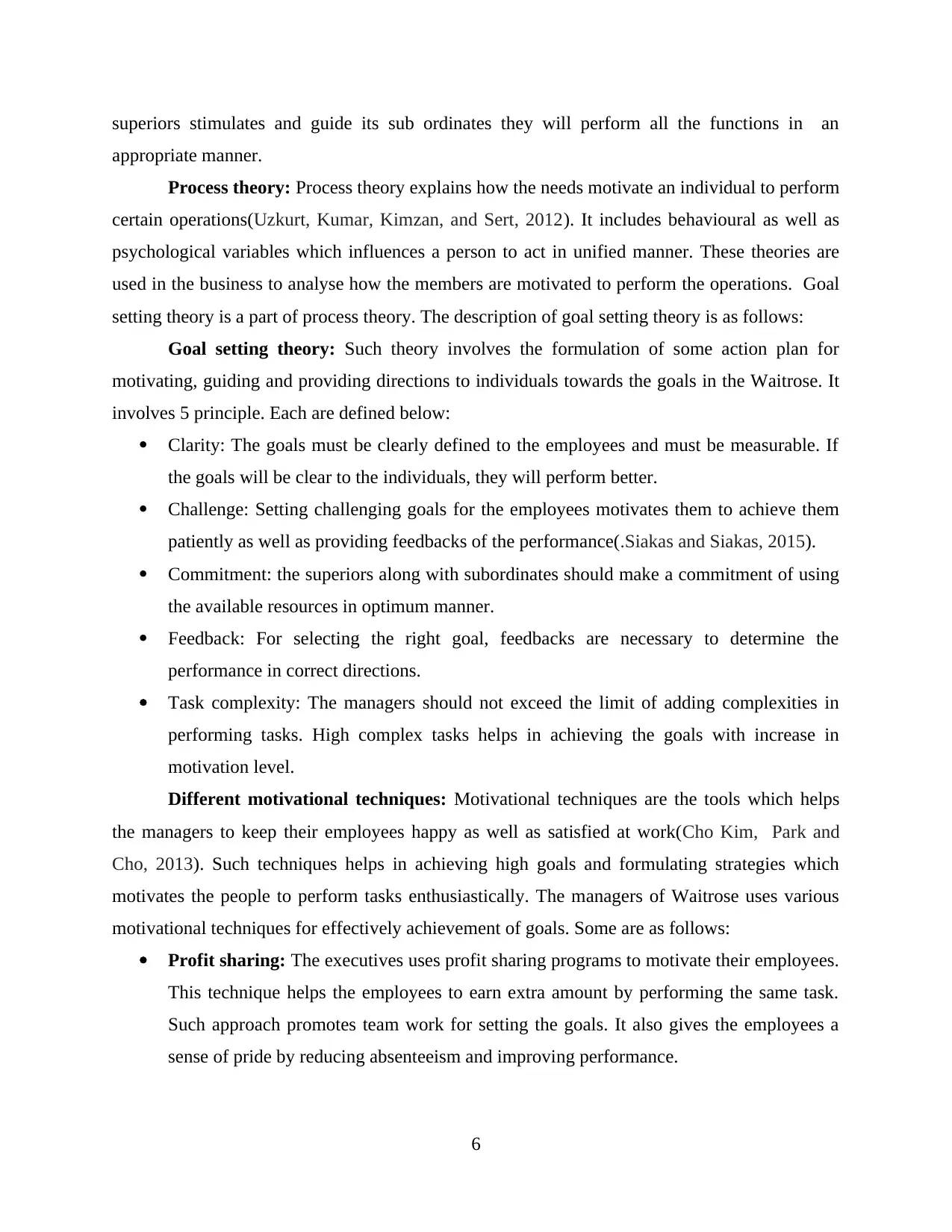
superiors stimulates and guide its sub ordinates they will perform all the functions in an
appropriate manner.
Process theory: Process theory explains how the needs motivate an individual to perform
certain operations(Uzkurt, Kumar, Kimzan, and Sert, 2012). It includes behavioural as well as
psychological variables which influences a person to act in unified manner. These theories are
used in the business to analyse how the members are motivated to perform the operations. Goal
setting theory is a part of process theory. The description of goal setting theory is as follows:
Goal setting theory: Such theory involves the formulation of some action plan for
motivating, guiding and providing directions to individuals towards the goals in the Waitrose. It
involves 5 principle. Each are defined below:
Clarity: The goals must be clearly defined to the employees and must be measurable. If
the goals will be clear to the individuals, they will perform better.
Challenge: Setting challenging goals for the employees motivates them to achieve them
patiently as well as providing feedbacks of the performance(.Siakas and Siakas, 2015).
Commitment: the superiors along with subordinates should make a commitment of using
the available resources in optimum manner.
Feedback: For selecting the right goal, feedbacks are necessary to determine the
performance in correct directions.
Task complexity: The managers should not exceed the limit of adding complexities in
performing tasks. High complex tasks helps in achieving the goals with increase in
motivation level.
Different motivational techniques: Motivational techniques are the tools which helps
the managers to keep their employees happy as well as satisfied at work(Cho Kim, Park and
Cho, 2013). Such techniques helps in achieving high goals and formulating strategies which
motivates the people to perform tasks enthusiastically. The managers of Waitrose uses various
motivational techniques for effectively achievement of goals. Some are as follows:
Profit sharing: The executives uses profit sharing programs to motivate their employees.
This technique helps the employees to earn extra amount by performing the same task.
Such approach promotes team work for setting the goals. It also gives the employees a
sense of pride by reducing absenteeism and improving performance.
6
appropriate manner.
Process theory: Process theory explains how the needs motivate an individual to perform
certain operations(Uzkurt, Kumar, Kimzan, and Sert, 2012). It includes behavioural as well as
psychological variables which influences a person to act in unified manner. These theories are
used in the business to analyse how the members are motivated to perform the operations. Goal
setting theory is a part of process theory. The description of goal setting theory is as follows:
Goal setting theory: Such theory involves the formulation of some action plan for
motivating, guiding and providing directions to individuals towards the goals in the Waitrose. It
involves 5 principle. Each are defined below:
Clarity: The goals must be clearly defined to the employees and must be measurable. If
the goals will be clear to the individuals, they will perform better.
Challenge: Setting challenging goals for the employees motivates them to achieve them
patiently as well as providing feedbacks of the performance(.Siakas and Siakas, 2015).
Commitment: the superiors along with subordinates should make a commitment of using
the available resources in optimum manner.
Feedback: For selecting the right goal, feedbacks are necessary to determine the
performance in correct directions.
Task complexity: The managers should not exceed the limit of adding complexities in
performing tasks. High complex tasks helps in achieving the goals with increase in
motivation level.
Different motivational techniques: Motivational techniques are the tools which helps
the managers to keep their employees happy as well as satisfied at work(Cho Kim, Park and
Cho, 2013). Such techniques helps in achieving high goals and formulating strategies which
motivates the people to perform tasks enthusiastically. The managers of Waitrose uses various
motivational techniques for effectively achievement of goals. Some are as follows:
Profit sharing: The executives uses profit sharing programs to motivate their employees.
This technique helps the employees to earn extra amount by performing the same task.
Such approach promotes team work for setting the goals. It also gives the employees a
sense of pride by reducing absenteeism and improving performance.
6
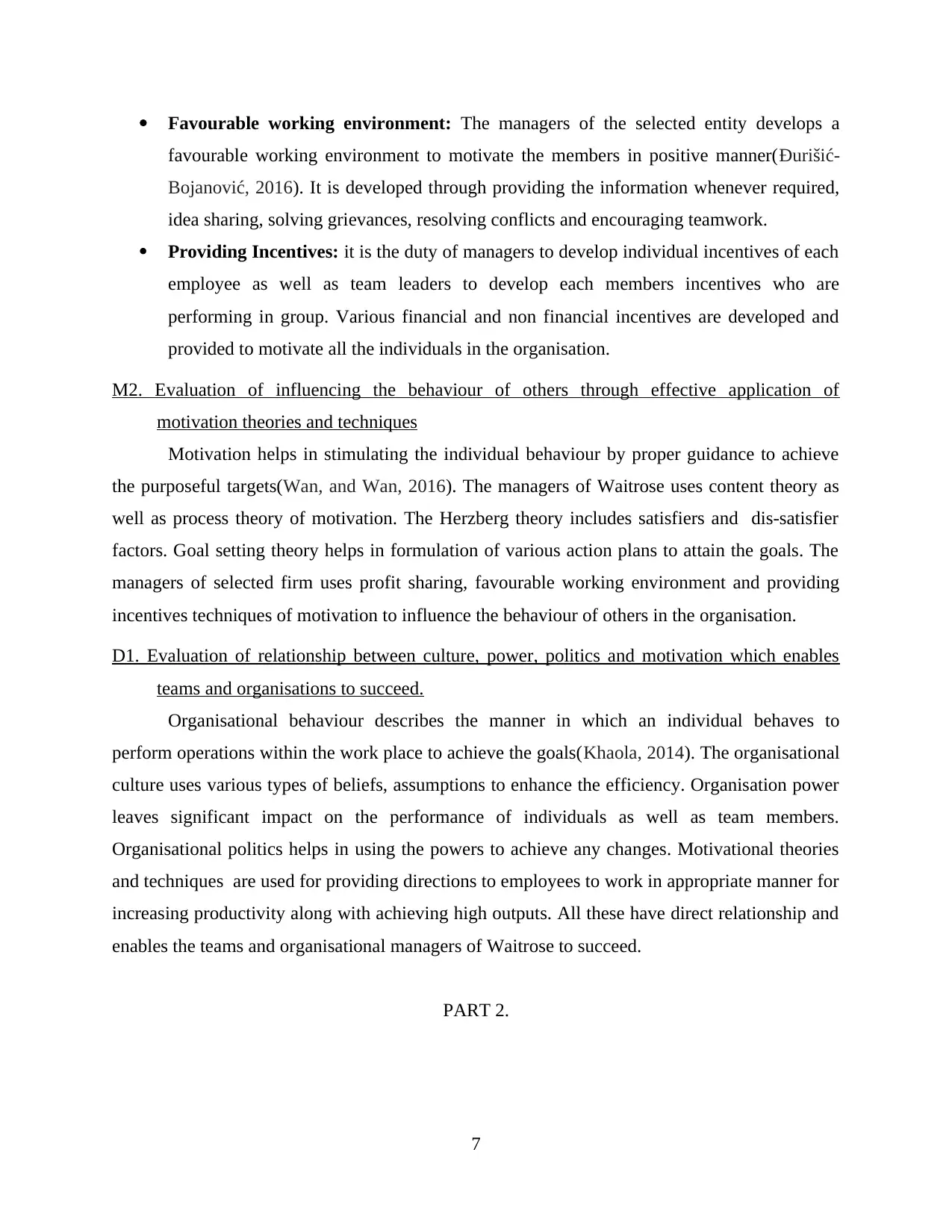
Favourable working environment: The managers of the selected entity develops a
favourable working environment to motivate the members in positive manner(Đurišić-
Bojanović, 2016). It is developed through providing the information whenever required,
idea sharing, solving grievances, resolving conflicts and encouraging teamwork.
Providing Incentives: it is the duty of managers to develop individual incentives of each
employee as well as team leaders to develop each members incentives who are
performing in group. Various financial and non financial incentives are developed and
provided to motivate all the individuals in the organisation.
M2. Evaluation of influencing the behaviour of others through effective application of
motivation theories and techniques
Motivation helps in stimulating the individual behaviour by proper guidance to achieve
the purposeful targets(Wan, and Wan, 2016). The managers of Waitrose uses content theory as
well as process theory of motivation. The Herzberg theory includes satisfiers and dis-satisfier
factors. Goal setting theory helps in formulation of various action plans to attain the goals. The
managers of selected firm uses profit sharing, favourable working environment and providing
incentives techniques of motivation to influence the behaviour of others in the organisation.
D1. Evaluation of relationship between culture, power, politics and motivation which enables
teams and organisations to succeed.
Organisational behaviour describes the manner in which an individual behaves to
perform operations within the work place to achieve the goals(Khaola, 2014). The organisational
culture uses various types of beliefs, assumptions to enhance the efficiency. Organisation power
leaves significant impact on the performance of individuals as well as team members.
Organisational politics helps in using the powers to achieve any changes. Motivational theories
and techniques are used for providing directions to employees to work in appropriate manner for
increasing productivity along with achieving high outputs. All these have direct relationship and
enables the teams and organisational managers of Waitrose to succeed.
PART 2.
7
favourable working environment to motivate the members in positive manner(Đurišić-
Bojanović, 2016). It is developed through providing the information whenever required,
idea sharing, solving grievances, resolving conflicts and encouraging teamwork.
Providing Incentives: it is the duty of managers to develop individual incentives of each
employee as well as team leaders to develop each members incentives who are
performing in group. Various financial and non financial incentives are developed and
provided to motivate all the individuals in the organisation.
M2. Evaluation of influencing the behaviour of others through effective application of
motivation theories and techniques
Motivation helps in stimulating the individual behaviour by proper guidance to achieve
the purposeful targets(Wan, and Wan, 2016). The managers of Waitrose uses content theory as
well as process theory of motivation. The Herzberg theory includes satisfiers and dis-satisfier
factors. Goal setting theory helps in formulation of various action plans to attain the goals. The
managers of selected firm uses profit sharing, favourable working environment and providing
incentives techniques of motivation to influence the behaviour of others in the organisation.
D1. Evaluation of relationship between culture, power, politics and motivation which enables
teams and organisations to succeed.
Organisational behaviour describes the manner in which an individual behaves to
perform operations within the work place to achieve the goals(Khaola, 2014). The organisational
culture uses various types of beliefs, assumptions to enhance the efficiency. Organisation power
leaves significant impact on the performance of individuals as well as team members.
Organisational politics helps in using the powers to achieve any changes. Motivational theories
and techniques are used for providing directions to employees to work in appropriate manner for
increasing productivity along with achieving high outputs. All these have direct relationship and
enables the teams and organisational managers of Waitrose to succeed.
PART 2.
7
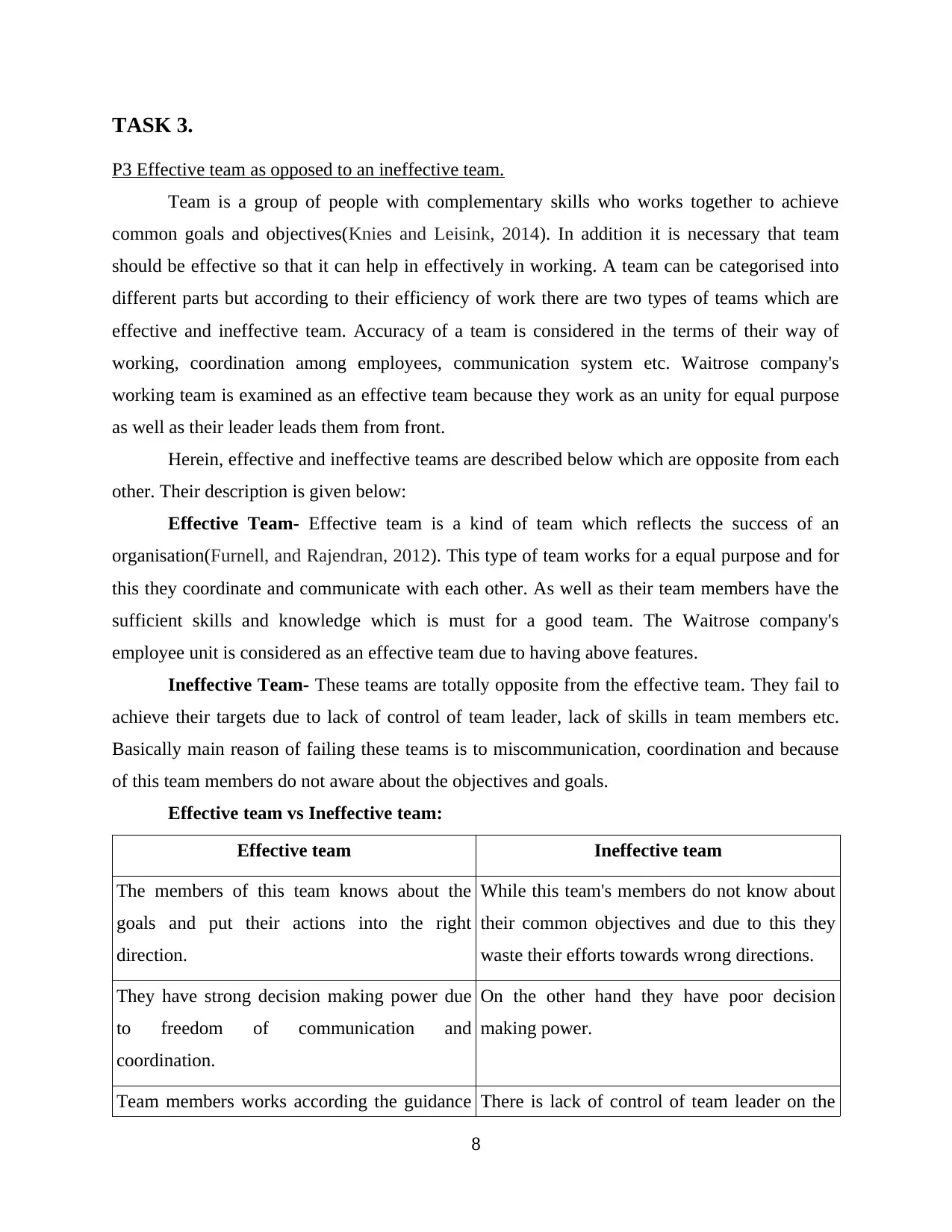
TASK 3.
P3 Effective team as opposed to an ineffective team.
Team is a group of people with complementary skills who works together to achieve
common goals and objectives(Knies and Leisink, 2014). In addition it is necessary that team
should be effective so that it can help in effectively in working. A team can be categorised into
different parts but according to their efficiency of work there are two types of teams which are
effective and ineffective team. Accuracy of a team is considered in the terms of their way of
working, coordination among employees, communication system etc. Waitrose company's
working team is examined as an effective team because they work as an unity for equal purpose
as well as their leader leads them from front.
Herein, effective and ineffective teams are described below which are opposite from each
other. Their description is given below:
Effective Team- Effective team is a kind of team which reflects the success of an
organisation(Furnell, and Rajendran, 2012). This type of team works for a equal purpose and for
this they coordinate and communicate with each other. As well as their team members have the
sufficient skills and knowledge which is must for a good team. The Waitrose company's
employee unit is considered as an effective team due to having above features.
Ineffective Team- These teams are totally opposite from the effective team. They fail to
achieve their targets due to lack of control of team leader, lack of skills in team members etc.
Basically main reason of failing these teams is to miscommunication, coordination and because
of this team members do not aware about the objectives and goals.
Effective team vs Ineffective team:
Effective team Ineffective team
The members of this team knows about the
goals and put their actions into the right
direction.
While this team's members do not know about
their common objectives and due to this they
waste their efforts towards wrong directions.
They have strong decision making power due
to freedom of communication and
coordination.
On the other hand they have poor decision
making power.
Team members works according the guidance There is lack of control of team leader on the
8
P3 Effective team as opposed to an ineffective team.
Team is a group of people with complementary skills who works together to achieve
common goals and objectives(Knies and Leisink, 2014). In addition it is necessary that team
should be effective so that it can help in effectively in working. A team can be categorised into
different parts but according to their efficiency of work there are two types of teams which are
effective and ineffective team. Accuracy of a team is considered in the terms of their way of
working, coordination among employees, communication system etc. Waitrose company's
working team is examined as an effective team because they work as an unity for equal purpose
as well as their leader leads them from front.
Herein, effective and ineffective teams are described below which are opposite from each
other. Their description is given below:
Effective Team- Effective team is a kind of team which reflects the success of an
organisation(Furnell, and Rajendran, 2012). This type of team works for a equal purpose and for
this they coordinate and communicate with each other. As well as their team members have the
sufficient skills and knowledge which is must for a good team. The Waitrose company's
employee unit is considered as an effective team due to having above features.
Ineffective Team- These teams are totally opposite from the effective team. They fail to
achieve their targets due to lack of control of team leader, lack of skills in team members etc.
Basically main reason of failing these teams is to miscommunication, coordination and because
of this team members do not aware about the objectives and goals.
Effective team vs Ineffective team:
Effective team Ineffective team
The members of this team knows about the
goals and put their actions into the right
direction.
While this team's members do not know about
their common objectives and due to this they
waste their efforts towards wrong directions.
They have strong decision making power due
to freedom of communication and
coordination.
On the other hand they have poor decision
making power.
Team members works according the guidance There is lack of control of team leader on the
8
Secure Best Marks with AI Grader
Need help grading? Try our AI Grader for instant feedback on your assignments.
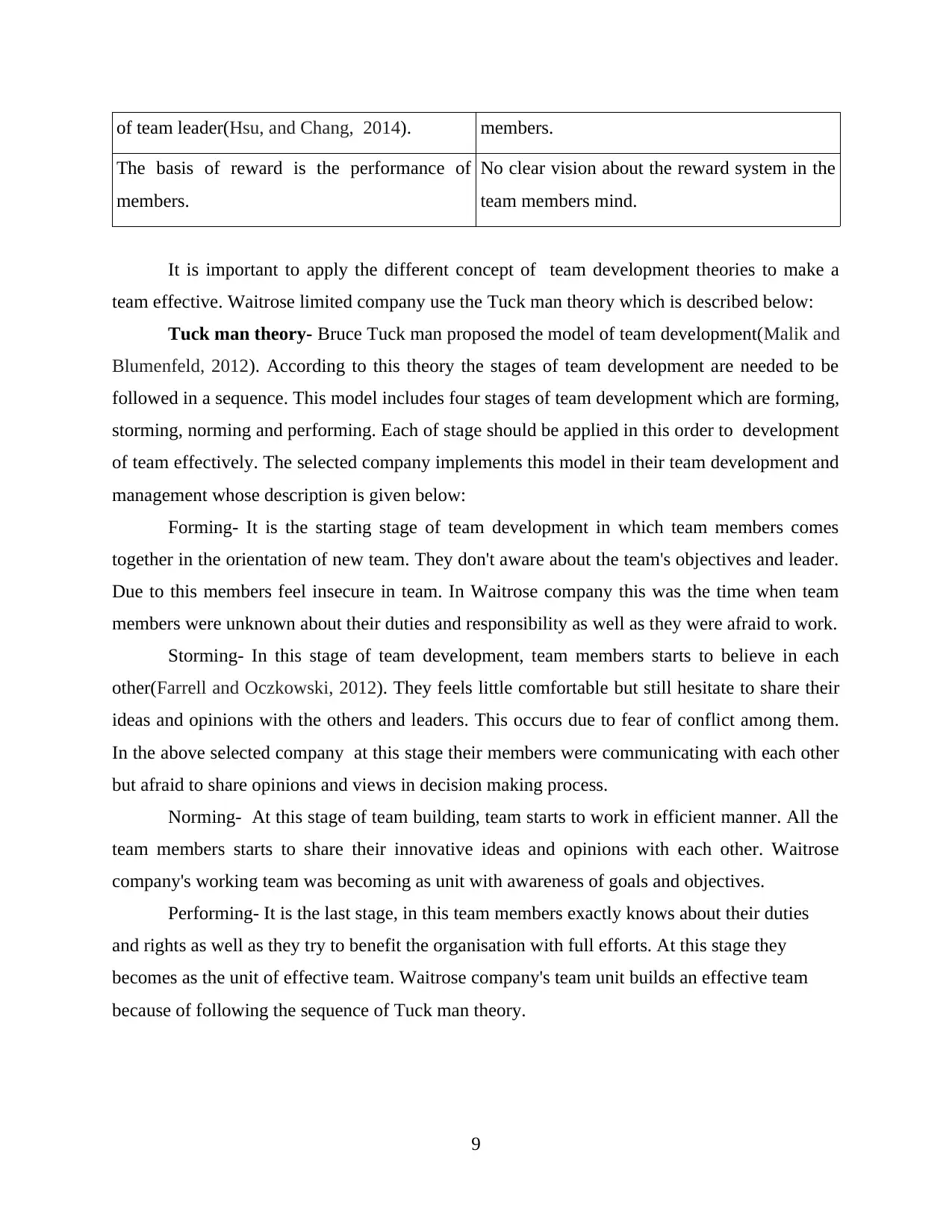
of team leader(Hsu, and Chang, 2014). members.
The basis of reward is the performance of
members.
No clear vision about the reward system in the
team members mind.
It is important to apply the different concept of team development theories to make a
team effective. Waitrose limited company use the Tuck man theory which is described below:
Tuck man theory- Bruce Tuck man proposed the model of team development(Malik and
Blumenfeld, 2012). According to this theory the stages of team development are needed to be
followed in a sequence. This model includes four stages of team development which are forming,
storming, norming and performing. Each of stage should be applied in this order to development
of team effectively. The selected company implements this model in their team development and
management whose description is given below:
Forming- It is the starting stage of team development in which team members comes
together in the orientation of new team. They don't aware about the team's objectives and leader.
Due to this members feel insecure in team. In Waitrose company this was the time when team
members were unknown about their duties and responsibility as well as they were afraid to work.
Storming- In this stage of team development, team members starts to believe in each
other(Farrell and Oczkowski, 2012). They feels little comfortable but still hesitate to share their
ideas and opinions with the others and leaders. This occurs due to fear of conflict among them.
In the above selected company at this stage their members were communicating with each other
but afraid to share opinions and views in decision making process.
Norming- At this stage of team building, team starts to work in efficient manner. All the
team members starts to share their innovative ideas and opinions with each other. Waitrose
company's working team was becoming as unit with awareness of goals and objectives.
Performing- It is the last stage, in this team members exactly knows about their duties
and rights as well as they try to benefit the organisation with full efforts. At this stage they
becomes as the unit of effective team. Waitrose company's team unit builds an effective team
because of following the sequence of Tuck man theory.
9
The basis of reward is the performance of
members.
No clear vision about the reward system in the
team members mind.
It is important to apply the different concept of team development theories to make a
team effective. Waitrose limited company use the Tuck man theory which is described below:
Tuck man theory- Bruce Tuck man proposed the model of team development(Malik and
Blumenfeld, 2012). According to this theory the stages of team development are needed to be
followed in a sequence. This model includes four stages of team development which are forming,
storming, norming and performing. Each of stage should be applied in this order to development
of team effectively. The selected company implements this model in their team development and
management whose description is given below:
Forming- It is the starting stage of team development in which team members comes
together in the orientation of new team. They don't aware about the team's objectives and leader.
Due to this members feel insecure in team. In Waitrose company this was the time when team
members were unknown about their duties and responsibility as well as they were afraid to work.
Storming- In this stage of team development, team members starts to believe in each
other(Farrell and Oczkowski, 2012). They feels little comfortable but still hesitate to share their
ideas and opinions with the others and leaders. This occurs due to fear of conflict among them.
In the above selected company at this stage their members were communicating with each other
but afraid to share opinions and views in decision making process.
Norming- At this stage of team building, team starts to work in efficient manner. All the
team members starts to share their innovative ideas and opinions with each other. Waitrose
company's working team was becoming as unit with awareness of goals and objectives.
Performing- It is the last stage, in this team members exactly knows about their duties
and rights as well as they try to benefit the organisation with full efforts. At this stage they
becomes as the unit of effective team. Waitrose company's team unit builds an effective team
because of following the sequence of Tuck man theory.
9
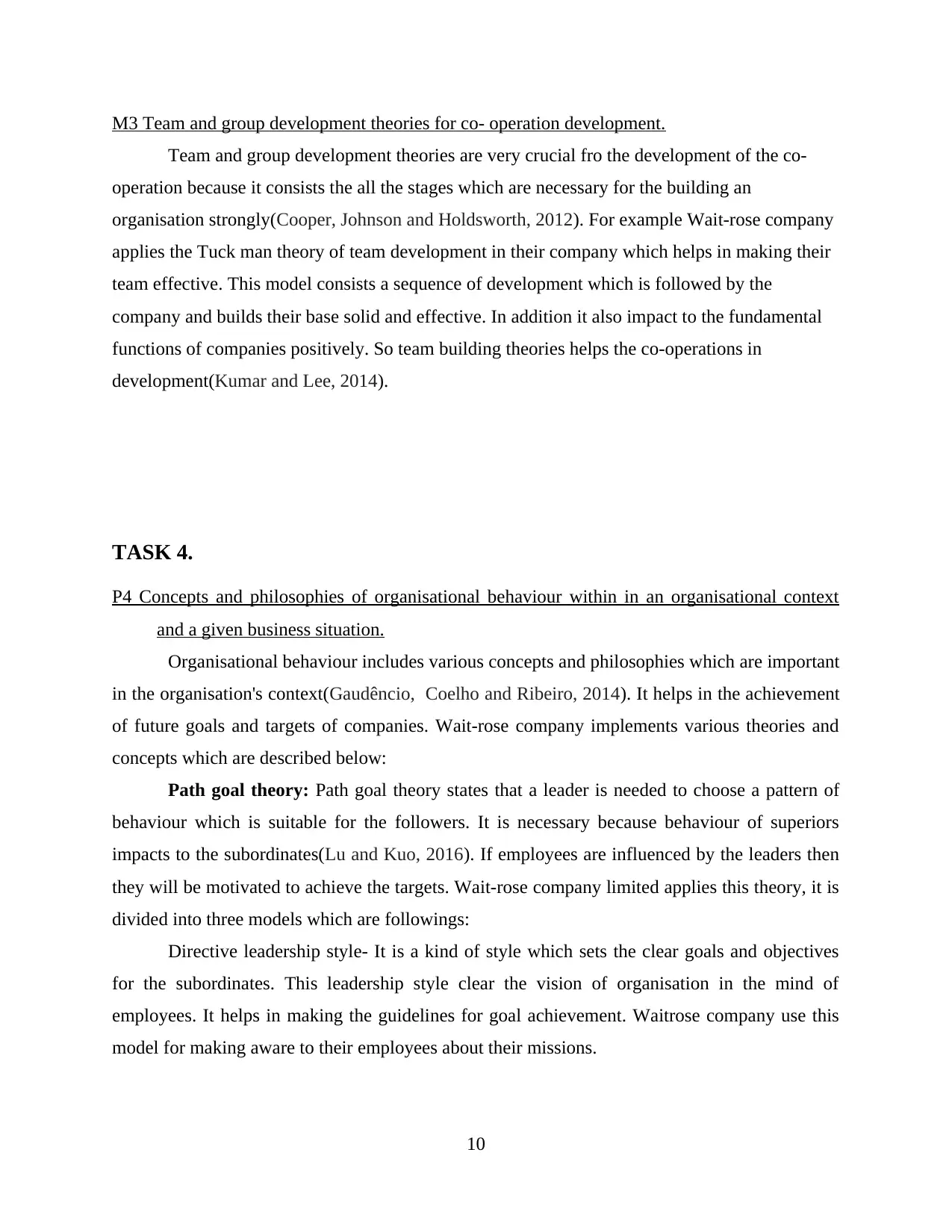
M3 Team and group development theories for co- operation development.
Team and group development theories are very crucial fro the development of the co-
operation because it consists the all the stages which are necessary for the building an
organisation strongly(Cooper, Johnson and Holdsworth, 2012). For example Wait-rose company
applies the Tuck man theory of team development in their company which helps in making their
team effective. This model consists a sequence of development which is followed by the
company and builds their base solid and effective. In addition it also impact to the fundamental
functions of companies positively. So team building theories helps the co-operations in
development(Kumar and Lee, 2014).
TASK 4.
P4 Concepts and philosophies of organisational behaviour within in an organisational context
and a given business situation.
Organisational behaviour includes various concepts and philosophies which are important
in the organisation's context(Gaudêncio, Coelho and Ribeiro, 2014). It helps in the achievement
of future goals and targets of companies. Wait-rose company implements various theories and
concepts which are described below:
Path goal theory: Path goal theory states that a leader is needed to choose a pattern of
behaviour which is suitable for the followers. It is necessary because behaviour of superiors
impacts to the subordinates(Lu and Kuo, 2016). If employees are influenced by the leaders then
they will be motivated to achieve the targets. Wait-rose company limited applies this theory, it is
divided into three models which are followings:
Directive leadership style- It is a kind of style which sets the clear goals and objectives
for the subordinates. This leadership style clear the vision of organisation in the mind of
employees. It helps in making the guidelines for goal achievement. Waitrose company use this
model for making aware to their employees about their missions.
10
Team and group development theories are very crucial fro the development of the co-
operation because it consists the all the stages which are necessary for the building an
organisation strongly(Cooper, Johnson and Holdsworth, 2012). For example Wait-rose company
applies the Tuck man theory of team development in their company which helps in making their
team effective. This model consists a sequence of development which is followed by the
company and builds their base solid and effective. In addition it also impact to the fundamental
functions of companies positively. So team building theories helps the co-operations in
development(Kumar and Lee, 2014).
TASK 4.
P4 Concepts and philosophies of organisational behaviour within in an organisational context
and a given business situation.
Organisational behaviour includes various concepts and philosophies which are important
in the organisation's context(Gaudêncio, Coelho and Ribeiro, 2014). It helps in the achievement
of future goals and targets of companies. Wait-rose company implements various theories and
concepts which are described below:
Path goal theory: Path goal theory states that a leader is needed to choose a pattern of
behaviour which is suitable for the followers. It is necessary because behaviour of superiors
impacts to the subordinates(Lu and Kuo, 2016). If employees are influenced by the leaders then
they will be motivated to achieve the targets. Wait-rose company limited applies this theory, it is
divided into three models which are followings:
Directive leadership style- It is a kind of style which sets the clear goals and objectives
for the subordinates. This leadership style clear the vision of organisation in the mind of
employees. It helps in making the guidelines for goal achievement. Waitrose company use this
model for making aware to their employees about their missions.
10
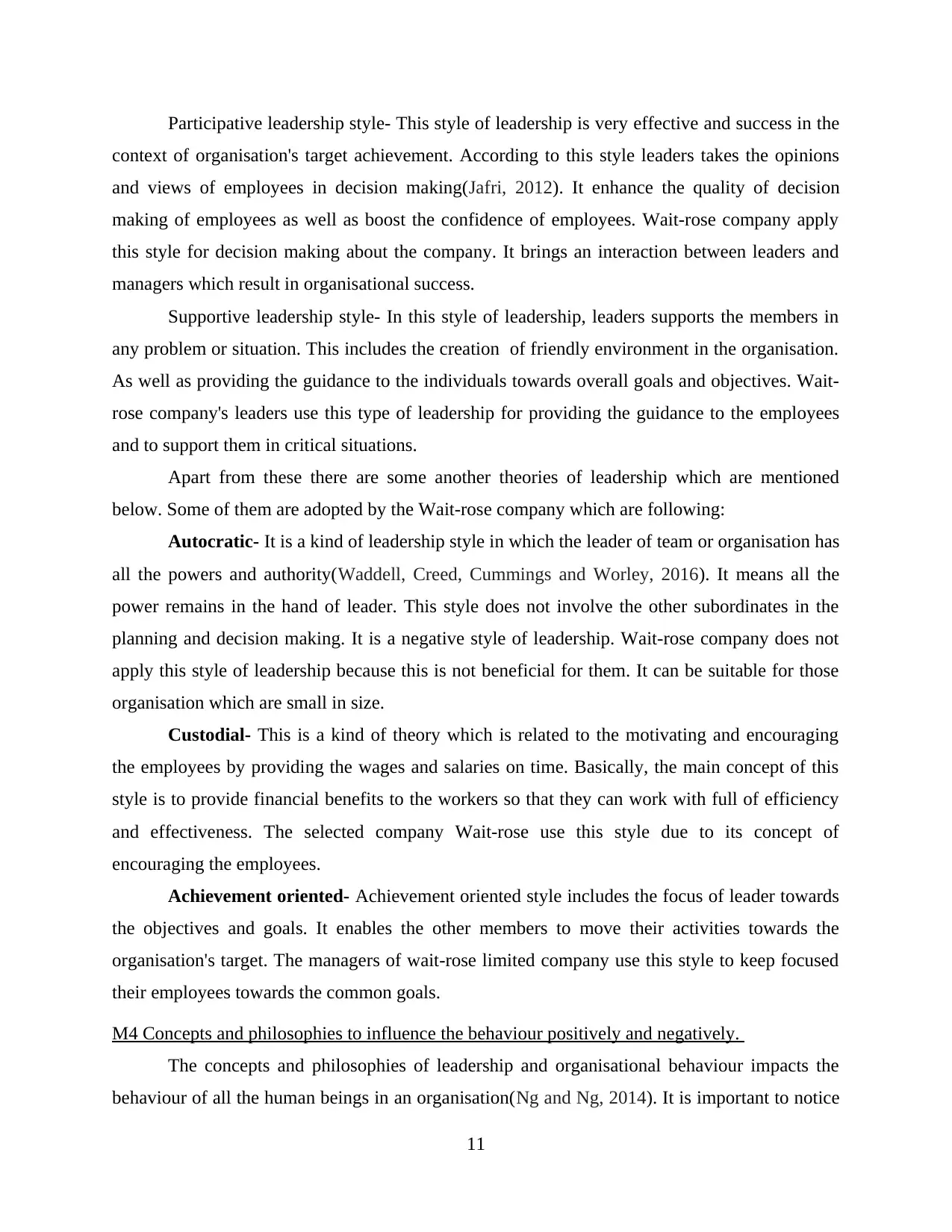
Participative leadership style- This style of leadership is very effective and success in the
context of organisation's target achievement. According to this style leaders takes the opinions
and views of employees in decision making(Jafri, 2012). It enhance the quality of decision
making of employees as well as boost the confidence of employees. Wait-rose company apply
this style for decision making about the company. It brings an interaction between leaders and
managers which result in organisational success.
Supportive leadership style- In this style of leadership, leaders supports the members in
any problem or situation. This includes the creation of friendly environment in the organisation.
As well as providing the guidance to the individuals towards overall goals and objectives. Wait-
rose company's leaders use this type of leadership for providing the guidance to the employees
and to support them in critical situations.
Apart from these there are some another theories of leadership which are mentioned
below. Some of them are adopted by the Wait-rose company which are following:
Autocratic- It is a kind of leadership style in which the leader of team or organisation has
all the powers and authority(Waddell, Creed, Cummings and Worley, 2016). It means all the
power remains in the hand of leader. This style does not involve the other subordinates in the
planning and decision making. It is a negative style of leadership. Wait-rose company does not
apply this style of leadership because this is not beneficial for them. It can be suitable for those
organisation which are small in size.
Custodial- This is a kind of theory which is related to the motivating and encouraging
the employees by providing the wages and salaries on time. Basically, the main concept of this
style is to provide financial benefits to the workers so that they can work with full of efficiency
and effectiveness. The selected company Wait-rose use this style due to its concept of
encouraging the employees.
Achievement oriented- Achievement oriented style includes the focus of leader towards
the objectives and goals. It enables the other members to move their activities towards the
organisation's target. The managers of wait-rose limited company use this style to keep focused
their employees towards the common goals.
M4 Concepts and philosophies to influence the behaviour positively and negatively.
The concepts and philosophies of leadership and organisational behaviour impacts the
behaviour of all the human beings in an organisation(Ng and Ng, 2014). It is important to notice
11
context of organisation's target achievement. According to this style leaders takes the opinions
and views of employees in decision making(Jafri, 2012). It enhance the quality of decision
making of employees as well as boost the confidence of employees. Wait-rose company apply
this style for decision making about the company. It brings an interaction between leaders and
managers which result in organisational success.
Supportive leadership style- In this style of leadership, leaders supports the members in
any problem or situation. This includes the creation of friendly environment in the organisation.
As well as providing the guidance to the individuals towards overall goals and objectives. Wait-
rose company's leaders use this type of leadership for providing the guidance to the employees
and to support them in critical situations.
Apart from these there are some another theories of leadership which are mentioned
below. Some of them are adopted by the Wait-rose company which are following:
Autocratic- It is a kind of leadership style in which the leader of team or organisation has
all the powers and authority(Waddell, Creed, Cummings and Worley, 2016). It means all the
power remains in the hand of leader. This style does not involve the other subordinates in the
planning and decision making. It is a negative style of leadership. Wait-rose company does not
apply this style of leadership because this is not beneficial for them. It can be suitable for those
organisation which are small in size.
Custodial- This is a kind of theory which is related to the motivating and encouraging
the employees by providing the wages and salaries on time. Basically, the main concept of this
style is to provide financial benefits to the workers so that they can work with full of efficiency
and effectiveness. The selected company Wait-rose use this style due to its concept of
encouraging the employees.
Achievement oriented- Achievement oriented style includes the focus of leader towards
the objectives and goals. It enables the other members to move their activities towards the
organisation's target. The managers of wait-rose limited company use this style to keep focused
their employees towards the common goals.
M4 Concepts and philosophies to influence the behaviour positively and negatively.
The concepts and philosophies of leadership and organisational behaviour impacts the
behaviour of all the human beings in an organisation(Ng and Ng, 2014). It is important to notice
11
Paraphrase This Document
Need a fresh take? Get an instant paraphrase of this document with our AI Paraphraser
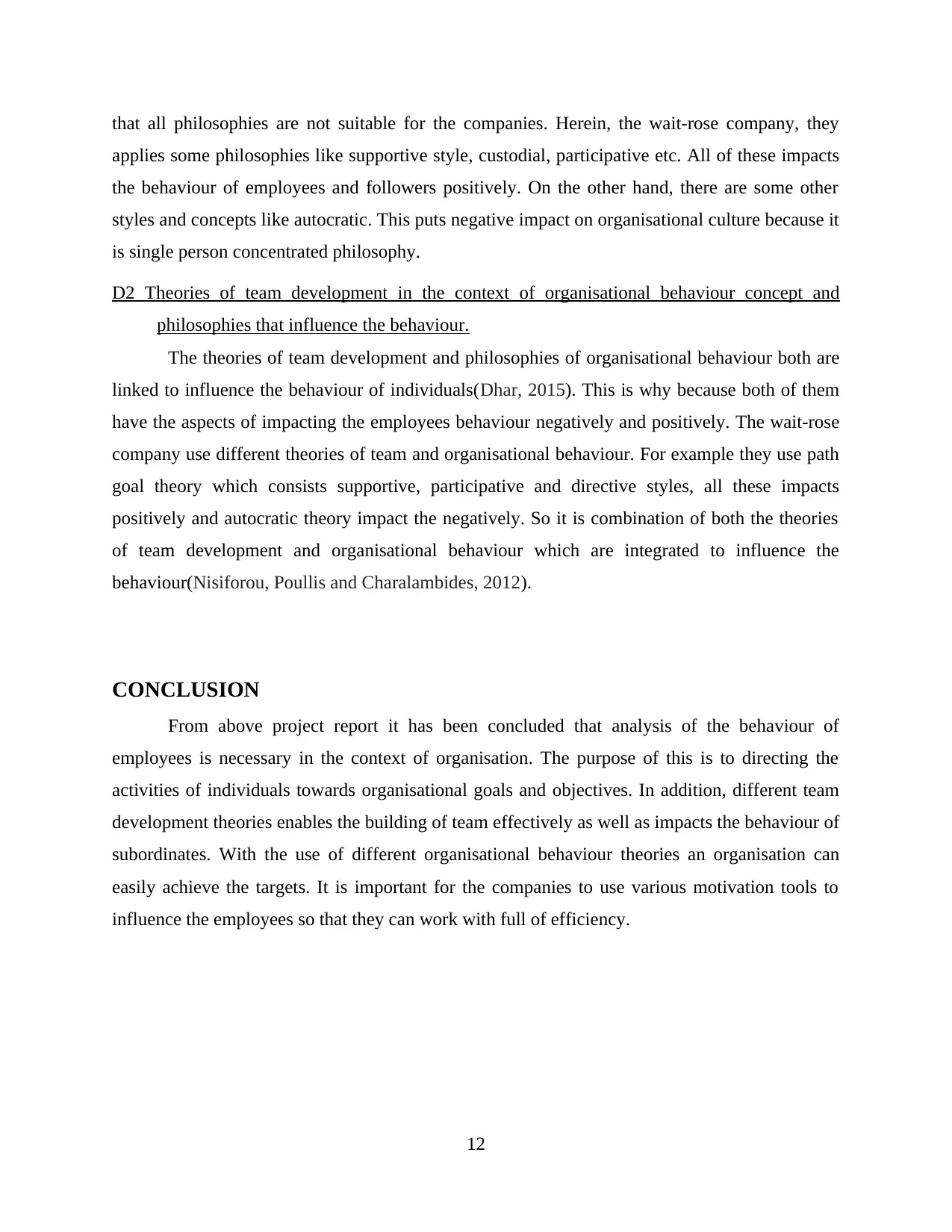
that all philosophies are not suitable for the companies. Herein, the wait-rose company, they
applies some philosophies like supportive style, custodial, participative etc. All of these impacts
the behaviour of employees and followers positively. On the other hand, there are some other
styles and concepts like autocratic. This puts negative impact on organisational culture because it
is single person concentrated philosophy.
D2 Theories of team development in the context of organisational behaviour concept and
philosophies that influence the behaviour.
The theories of team development and philosophies of organisational behaviour both are
linked to influence the behaviour of individuals(Dhar, 2015). This is why because both of them
have the aspects of impacting the employees behaviour negatively and positively. The wait-rose
company use different theories of team and organisational behaviour. For example they use path
goal theory which consists supportive, participative and directive styles, all these impacts
positively and autocratic theory impact the negatively. So it is combination of both the theories
of team development and organisational behaviour which are integrated to influence the
behaviour(Nisiforou, Poullis and Charalambides, 2012).
CONCLUSION
From above project report it has been concluded that analysis of the behaviour of
employees is necessary in the context of organisation. The purpose of this is to directing the
activities of individuals towards organisational goals and objectives. In addition, different team
development theories enables the building of team effectively as well as impacts the behaviour of
subordinates. With the use of different organisational behaviour theories an organisation can
easily achieve the targets. It is important for the companies to use various motivation tools to
influence the employees so that they can work with full of efficiency.
12
applies some philosophies like supportive style, custodial, participative etc. All of these impacts
the behaviour of employees and followers positively. On the other hand, there are some other
styles and concepts like autocratic. This puts negative impact on organisational culture because it
is single person concentrated philosophy.
D2 Theories of team development in the context of organisational behaviour concept and
philosophies that influence the behaviour.
The theories of team development and philosophies of organisational behaviour both are
linked to influence the behaviour of individuals(Dhar, 2015). This is why because both of them
have the aspects of impacting the employees behaviour negatively and positively. The wait-rose
company use different theories of team and organisational behaviour. For example they use path
goal theory which consists supportive, participative and directive styles, all these impacts
positively and autocratic theory impact the negatively. So it is combination of both the theories
of team development and organisational behaviour which are integrated to influence the
behaviour(Nisiforou, Poullis and Charalambides, 2012).
CONCLUSION
From above project report it has been concluded that analysis of the behaviour of
employees is necessary in the context of organisation. The purpose of this is to directing the
activities of individuals towards organisational goals and objectives. In addition, different team
development theories enables the building of team effectively as well as impacts the behaviour of
subordinates. With the use of different organisational behaviour theories an organisation can
easily achieve the targets. It is important for the companies to use various motivation tools to
influence the employees so that they can work with full of efficiency.
12

13
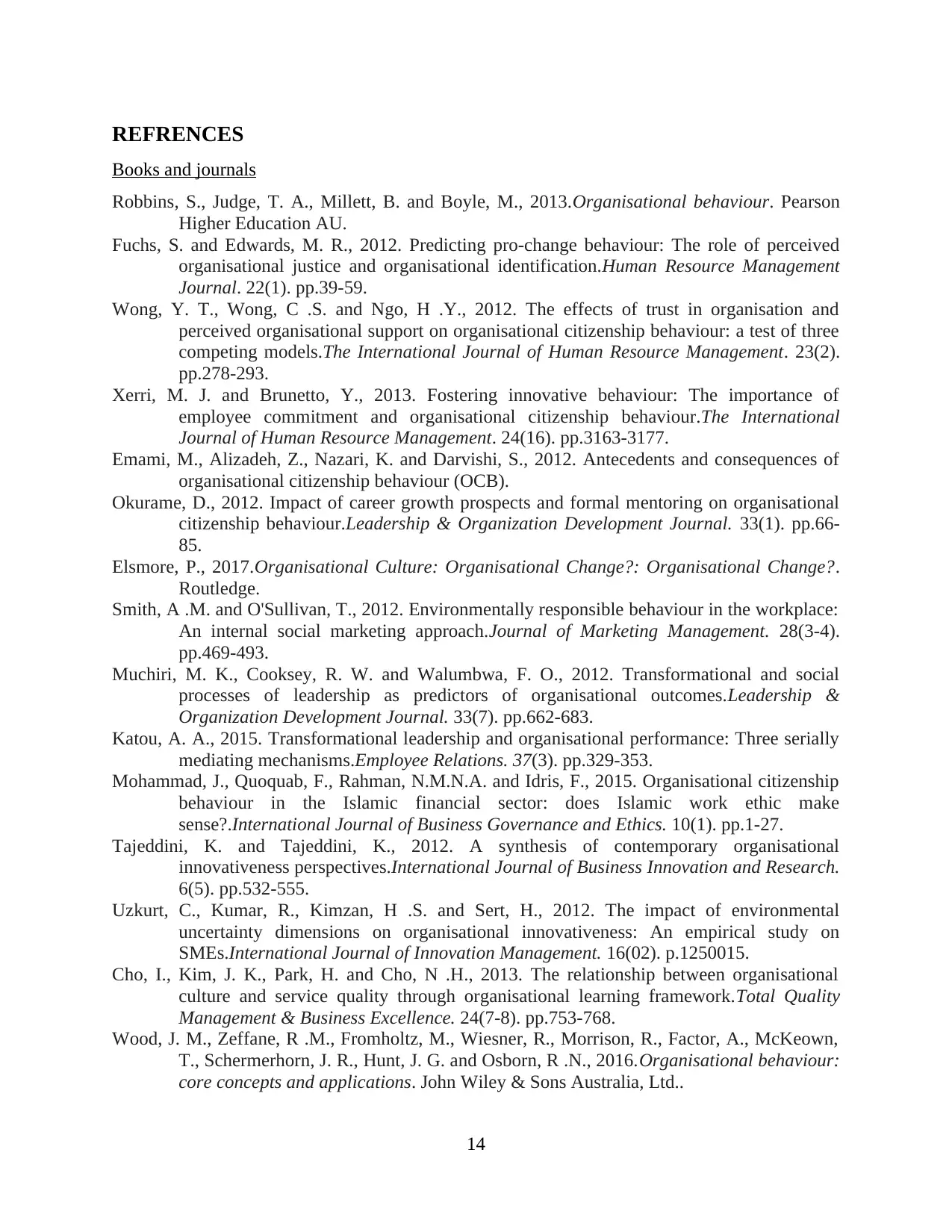
REFRENCES
Books and journals
Robbins, S., Judge, T. A., Millett, B. and Boyle, M., 2013.Organisational behaviour. Pearson
Higher Education AU.
Fuchs, S. and Edwards, M. R., 2012. Predicting pro‐change behaviour: The role of perceived
organisational justice and organisational identification.Human Resource Management
Journal. 22(1). pp.39-59.
Wong, Y. T., Wong, C .S. and Ngo, H .Y., 2012. The effects of trust in organisation and
perceived organisational support on organisational citizenship behaviour: a test of three
competing models.The International Journal of Human Resource Management. 23(2).
pp.278-293.
Xerri, M. J. and Brunetto, Y., 2013. Fostering innovative behaviour: The importance of
employee commitment and organisational citizenship behaviour.The International
Journal of Human Resource Management. 24(16). pp.3163-3177.
Emami, M., Alizadeh, Z., Nazari, K. and Darvishi, S., 2012. Antecedents and consequences of
organisational citizenship behaviour (OCB).
Okurame, D., 2012. Impact of career growth prospects and formal mentoring on organisational
citizenship behaviour.Leadership & Organization Development Journal. 33(1). pp.66-
85.
Elsmore, P., 2017.Organisational Culture: Organisational Change?: Organisational Change?.
Routledge.
Smith, A .M. and O'Sullivan, T., 2012. Environmentally responsible behaviour in the workplace:
An internal social marketing approach.Journal of Marketing Management. 28(3-4).
pp.469-493.
Muchiri, M. K., Cooksey, R. W. and Walumbwa, F. O., 2012. Transformational and social
processes of leadership as predictors of organisational outcomes.Leadership &
Organization Development Journal. 33(7). pp.662-683.
Katou, A. A., 2015. Transformational leadership and organisational performance: Three serially
mediating mechanisms.Employee Relations. 37(3). pp.329-353.
Mohammad, J., Quoquab, F., Rahman, N.M.N.A. and Idris, F., 2015. Organisational citizenship
behaviour in the Islamic financial sector: does Islamic work ethic make
sense?.International Journal of Business Governance and Ethics. 10(1). pp.1-27.
Tajeddini, K. and Tajeddini, K., 2012. A synthesis of contemporary organisational
innovativeness perspectives.International Journal of Business Innovation and Research.
6(5). pp.532-555.
Uzkurt, C., Kumar, R., Kimzan, H .S. and Sert, H., 2012. The impact of environmental
uncertainty dimensions on organisational innovativeness: An empirical study on
SMEs.International Journal of Innovation Management. 16(02). p.1250015.
Cho, I., Kim, J. K., Park, H. and Cho, N .H., 2013. The relationship between organisational
culture and service quality through organisational learning framework.Total Quality
Management & Business Excellence. 24(7-8). pp.753-768.
Wood, J. M., Zeffane, R .M., Fromholtz, M., Wiesner, R., Morrison, R., Factor, A., McKeown,
T., Schermerhorn, J. R., Hunt, J. G. and Osborn, R .N., 2016.Organisational behaviour:
core concepts and applications. John Wiley & Sons Australia, Ltd..
14
Books and journals
Robbins, S., Judge, T. A., Millett, B. and Boyle, M., 2013.Organisational behaviour. Pearson
Higher Education AU.
Fuchs, S. and Edwards, M. R., 2012. Predicting pro‐change behaviour: The role of perceived
organisational justice and organisational identification.Human Resource Management
Journal. 22(1). pp.39-59.
Wong, Y. T., Wong, C .S. and Ngo, H .Y., 2012. The effects of trust in organisation and
perceived organisational support on organisational citizenship behaviour: a test of three
competing models.The International Journal of Human Resource Management. 23(2).
pp.278-293.
Xerri, M. J. and Brunetto, Y., 2013. Fostering innovative behaviour: The importance of
employee commitment and organisational citizenship behaviour.The International
Journal of Human Resource Management. 24(16). pp.3163-3177.
Emami, M., Alizadeh, Z., Nazari, K. and Darvishi, S., 2012. Antecedents and consequences of
organisational citizenship behaviour (OCB).
Okurame, D., 2012. Impact of career growth prospects and formal mentoring on organisational
citizenship behaviour.Leadership & Organization Development Journal. 33(1). pp.66-
85.
Elsmore, P., 2017.Organisational Culture: Organisational Change?: Organisational Change?.
Routledge.
Smith, A .M. and O'Sullivan, T., 2012. Environmentally responsible behaviour in the workplace:
An internal social marketing approach.Journal of Marketing Management. 28(3-4).
pp.469-493.
Muchiri, M. K., Cooksey, R. W. and Walumbwa, F. O., 2012. Transformational and social
processes of leadership as predictors of organisational outcomes.Leadership &
Organization Development Journal. 33(7). pp.662-683.
Katou, A. A., 2015. Transformational leadership and organisational performance: Three serially
mediating mechanisms.Employee Relations. 37(3). pp.329-353.
Mohammad, J., Quoquab, F., Rahman, N.M.N.A. and Idris, F., 2015. Organisational citizenship
behaviour in the Islamic financial sector: does Islamic work ethic make
sense?.International Journal of Business Governance and Ethics. 10(1). pp.1-27.
Tajeddini, K. and Tajeddini, K., 2012. A synthesis of contemporary organisational
innovativeness perspectives.International Journal of Business Innovation and Research.
6(5). pp.532-555.
Uzkurt, C., Kumar, R., Kimzan, H .S. and Sert, H., 2012. The impact of environmental
uncertainty dimensions on organisational innovativeness: An empirical study on
SMEs.International Journal of Innovation Management. 16(02). p.1250015.
Cho, I., Kim, J. K., Park, H. and Cho, N .H., 2013. The relationship between organisational
culture and service quality through organisational learning framework.Total Quality
Management & Business Excellence. 24(7-8). pp.753-768.
Wood, J. M., Zeffane, R .M., Fromholtz, M., Wiesner, R., Morrison, R., Factor, A., McKeown,
T., Schermerhorn, J. R., Hunt, J. G. and Osborn, R .N., 2016.Organisational behaviour:
core concepts and applications. John Wiley & Sons Australia, Ltd..
14
Secure Best Marks with AI Grader
Need help grading? Try our AI Grader for instant feedback on your assignments.
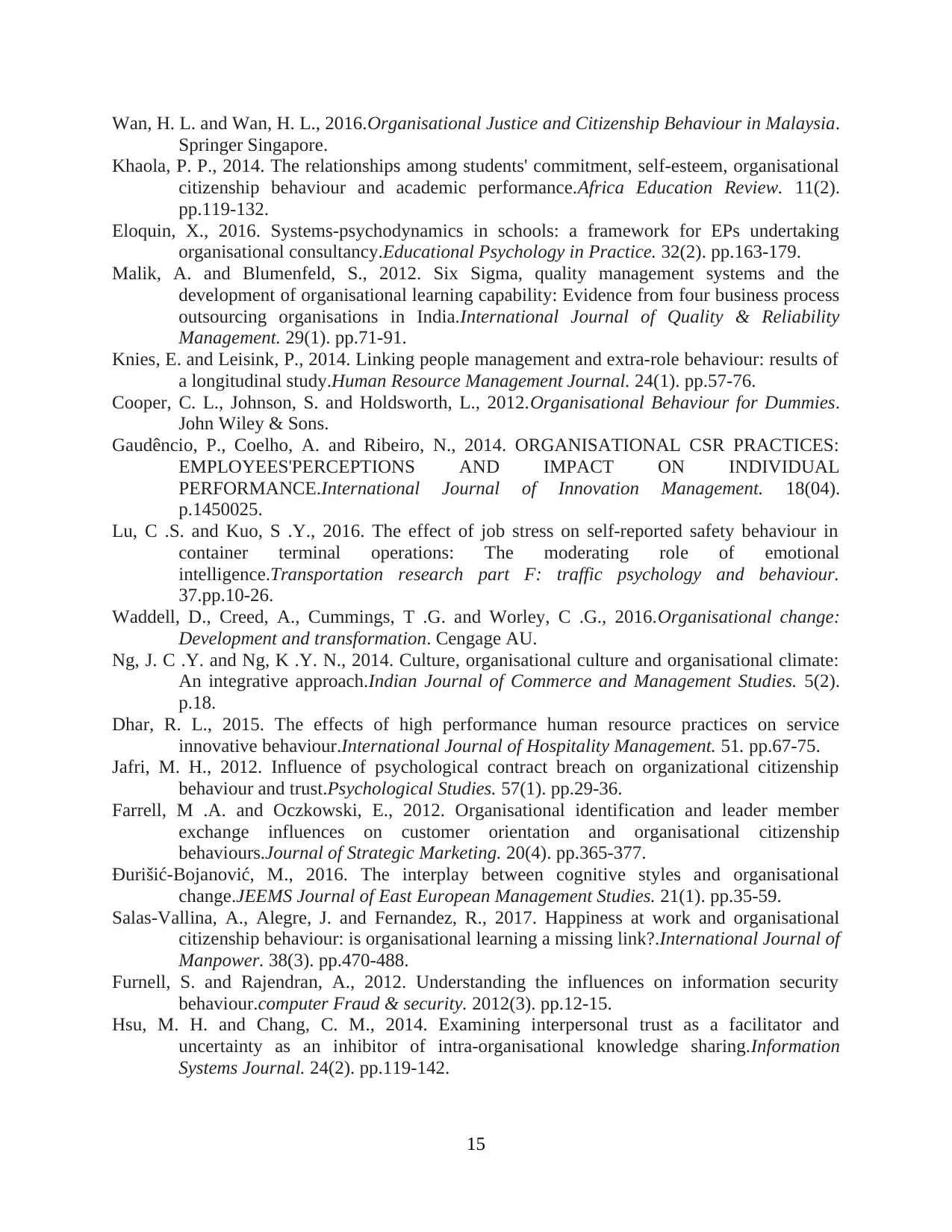
Wan, H. L. and Wan, H. L., 2016.Organisational Justice and Citizenship Behaviour in Malaysia.
Springer Singapore.
Khaola, P. P., 2014. The relationships among students' commitment, self-esteem, organisational
citizenship behaviour and academic performance.Africa Education Review. 11(2).
pp.119-132.
Eloquin, X., 2016. Systems-psychodynamics in schools: a framework for EPs undertaking
organisational consultancy.Educational Psychology in Practice. 32(2). pp.163-179.
Malik, A. and Blumenfeld, S., 2012. Six Sigma, quality management systems and the
development of organisational learning capability: Evidence from four business process
outsourcing organisations in India.International Journal of Quality & Reliability
Management. 29(1). pp.71-91.
Knies, E. and Leisink, P., 2014. Linking people management and extra‐role behaviour: results of
a longitudinal study.Human Resource Management Journal. 24(1). pp.57-76.
Cooper, C. L., Johnson, S. and Holdsworth, L., 2012.Organisational Behaviour for Dummies.
John Wiley & Sons.
Gaudêncio, P., Coelho, A. and Ribeiro, N., 2014. ORGANISATIONAL CSR PRACTICES:
EMPLOYEES'PERCEPTIONS AND IMPACT ON INDIVIDUAL
PERFORMANCE.International Journal of Innovation Management. 18(04).
p.1450025.
Lu, C .S. and Kuo, S .Y., 2016. The effect of job stress on self-reported safety behaviour in
container terminal operations: The moderating role of emotional
intelligence.Transportation research part F: traffic psychology and behaviour.
37.pp.10-26.
Waddell, D., Creed, A., Cummings, T .G. and Worley, C .G., 2016.Organisational change:
Development and transformation. Cengage AU.
Ng, J. C .Y. and Ng, K .Y. N., 2014. Culture, organisational culture and organisational climate:
An integrative approach.Indian Journal of Commerce and Management Studies. 5(2).
p.18.
Dhar, R. L., 2015. The effects of high performance human resource practices on service
innovative behaviour.International Journal of Hospitality Management. 51. pp.67-75.
Jafri, M. H., 2012. Influence of psychological contract breach on organizational citizenship
behaviour and trust.Psychological Studies. 57(1). pp.29-36.
Farrell, M .A. and Oczkowski, E., 2012. Organisational identification and leader member
exchange influences on customer orientation and organisational citizenship
behaviours.Journal of Strategic Marketing. 20(4). pp.365-377.
Đurišić-Bojanović, M., 2016. The interplay between cognitive styles and organisational
change.JEEMS Journal of East European Management Studies. 21(1). pp.35-59.
Salas-Vallina, A., Alegre, J. and Fernandez, R., 2017. Happiness at work and organisational
citizenship behaviour: is organisational learning a missing link?.International Journal of
Manpower. 38(3). pp.470-488.
Furnell, S. and Rajendran, A., 2012. Understanding the influences on information security
behaviour.computer Fraud & security. 2012(3). pp.12-15.
Hsu, M. H. and Chang, C. M., 2014. Examining interpersonal trust as a facilitator and
uncertainty as an inhibitor of intra‐organisational knowledge sharing.Information
Systems Journal. 24(2). pp.119-142.
15
Springer Singapore.
Khaola, P. P., 2014. The relationships among students' commitment, self-esteem, organisational
citizenship behaviour and academic performance.Africa Education Review. 11(2).
pp.119-132.
Eloquin, X., 2016. Systems-psychodynamics in schools: a framework for EPs undertaking
organisational consultancy.Educational Psychology in Practice. 32(2). pp.163-179.
Malik, A. and Blumenfeld, S., 2012. Six Sigma, quality management systems and the
development of organisational learning capability: Evidence from four business process
outsourcing organisations in India.International Journal of Quality & Reliability
Management. 29(1). pp.71-91.
Knies, E. and Leisink, P., 2014. Linking people management and extra‐role behaviour: results of
a longitudinal study.Human Resource Management Journal. 24(1). pp.57-76.
Cooper, C. L., Johnson, S. and Holdsworth, L., 2012.Organisational Behaviour for Dummies.
John Wiley & Sons.
Gaudêncio, P., Coelho, A. and Ribeiro, N., 2014. ORGANISATIONAL CSR PRACTICES:
EMPLOYEES'PERCEPTIONS AND IMPACT ON INDIVIDUAL
PERFORMANCE.International Journal of Innovation Management. 18(04).
p.1450025.
Lu, C .S. and Kuo, S .Y., 2016. The effect of job stress on self-reported safety behaviour in
container terminal operations: The moderating role of emotional
intelligence.Transportation research part F: traffic psychology and behaviour.
37.pp.10-26.
Waddell, D., Creed, A., Cummings, T .G. and Worley, C .G., 2016.Organisational change:
Development and transformation. Cengage AU.
Ng, J. C .Y. and Ng, K .Y. N., 2014. Culture, organisational culture and organisational climate:
An integrative approach.Indian Journal of Commerce and Management Studies. 5(2).
p.18.
Dhar, R. L., 2015. The effects of high performance human resource practices on service
innovative behaviour.International Journal of Hospitality Management. 51. pp.67-75.
Jafri, M. H., 2012. Influence of psychological contract breach on organizational citizenship
behaviour and trust.Psychological Studies. 57(1). pp.29-36.
Farrell, M .A. and Oczkowski, E., 2012. Organisational identification and leader member
exchange influences on customer orientation and organisational citizenship
behaviours.Journal of Strategic Marketing. 20(4). pp.365-377.
Đurišić-Bojanović, M., 2016. The interplay between cognitive styles and organisational
change.JEEMS Journal of East European Management Studies. 21(1). pp.35-59.
Salas-Vallina, A., Alegre, J. and Fernandez, R., 2017. Happiness at work and organisational
citizenship behaviour: is organisational learning a missing link?.International Journal of
Manpower. 38(3). pp.470-488.
Furnell, S. and Rajendran, A., 2012. Understanding the influences on information security
behaviour.computer Fraud & security. 2012(3). pp.12-15.
Hsu, M. H. and Chang, C. M., 2014. Examining interpersonal trust as a facilitator and
uncertainty as an inhibitor of intra‐organisational knowledge sharing.Information
Systems Journal. 24(2). pp.119-142.
15
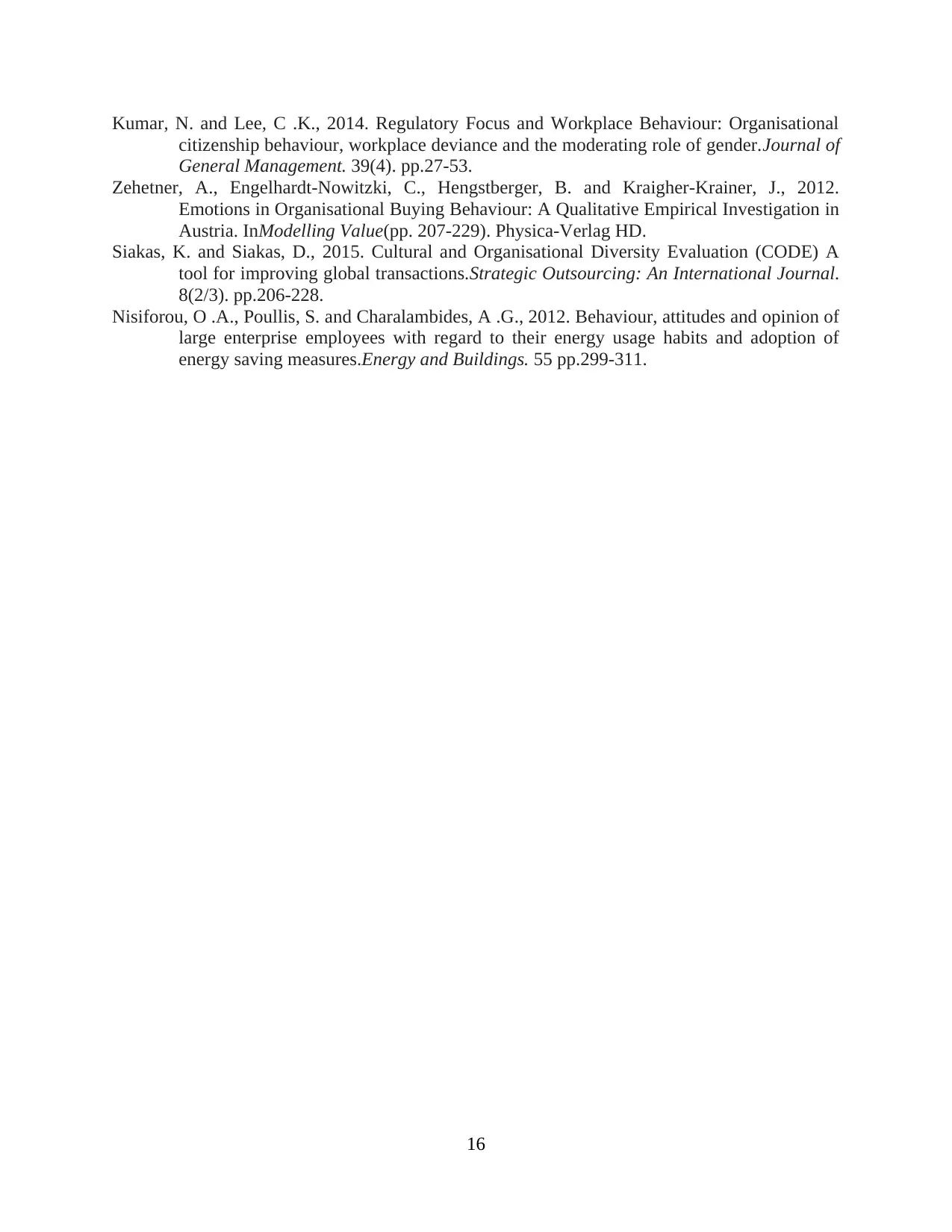
Kumar, N. and Lee, C .K., 2014. Regulatory Focus and Workplace Behaviour: Organisational
citizenship behaviour, workplace deviance and the moderating role of gender.Journal of
General Management. 39(4). pp.27-53.
Zehetner, A., Engelhardt-Nowitzki, C., Hengstberger, B. and Kraigher-Krainer, J., 2012.
Emotions in Organisational Buying Behaviour: A Qualitative Empirical Investigation in
Austria. InModelling Value(pp. 207-229). Physica-Verlag HD.
Siakas, K. and Siakas, D., 2015. Cultural and Organisational Diversity Evaluation (CODE) A
tool for improving global transactions.Strategic Outsourcing: An International Journal.
8(2/3). pp.206-228.
Nisiforou, O .A., Poullis, S. and Charalambides, A .G., 2012. Behaviour, attitudes and opinion of
large enterprise employees with regard to their energy usage habits and adoption of
energy saving measures.Energy and Buildings. 55 pp.299-311.
16
citizenship behaviour, workplace deviance and the moderating role of gender.Journal of
General Management. 39(4). pp.27-53.
Zehetner, A., Engelhardt-Nowitzki, C., Hengstberger, B. and Kraigher-Krainer, J., 2012.
Emotions in Organisational Buying Behaviour: A Qualitative Empirical Investigation in
Austria. InModelling Value(pp. 207-229). Physica-Verlag HD.
Siakas, K. and Siakas, D., 2015. Cultural and Organisational Diversity Evaluation (CODE) A
tool for improving global transactions.Strategic Outsourcing: An International Journal.
8(2/3). pp.206-228.
Nisiforou, O .A., Poullis, S. and Charalambides, A .G., 2012. Behaviour, attitudes and opinion of
large enterprise employees with regard to their energy usage habits and adoption of
energy saving measures.Energy and Buildings. 55 pp.299-311.
16
1 out of 18
Related Documents
Your All-in-One AI-Powered Toolkit for Academic Success.
+13062052269
info@desklib.com
Available 24*7 on WhatsApp / Email
![[object Object]](/_next/static/media/star-bottom.7253800d.svg)
Unlock your academic potential
© 2024 | Zucol Services PVT LTD | All rights reserved.





